#not explicitly mourning or suffering from painful grief
Text
just realising I won't have silly meowing conversations with the cat anymore, or scritch her stupid lil head, or be greeted by her and let her in when I come home from work late at night, or give her food when she loudly demands it.
damn. lots of things to get used to.
#i spent several years trying to acclimate her to pets and scritches after her first traumatic vet visit...#at least i got her to trust me enough to let me pet her sometimes#not explicitly mourning or suffering from painful grief#but it's more a disconnected distant sadness.? like i'll miss the little everyday moments#kinda how i miss the holiday lunches at my late grandma's place#and all the little things she and my grandpa did for me and my cousin whenever we stayed over at their place as kids#grieving is almost too nebulous to grasp for me. idk if i'm doing it right#i don't really feel anything. it's always been like this. just makes me feel so alienated from others. idk.
2 notes
·
View notes
Text
Amber Lives AU - Part 1
Alternate season 4 finale. Amber survives the crash and we flip the script on the Amber and House hallucinations.
House's Head plays out pretty much as per canon, with House trying to figure out what he forgot and the events leading up to the crash, including ~exploring the memories~ and everything with the bus. We have to pack a little more in though, so House realizes it was Amber earlier and the episode ends with Wilson asking House to do the deep brain stimulation. It ends with House nodding.
Wilson’s Heart is where things really divert. The episode starts with Amber waking up in the hospital bed and Wilson is in the chair beside her. She asks what happened and Wilson says "You were in a bus accident. A truck-" she cuts him off and asks if House is okay, if he’s hurt. Wilson takes her hand and starts tearing up, he says that House didn't survive the crash.
Cut to theme song.
Throughout the episode we follow Amber's recovery, but something is off. She can't remember what happened after she got on the bus. Wilson is acting weird and evasive and it's not just grief, it's something else.
She's also being visited by the team, they're all clearly mourning as well, but they're trying, they're being friendly. It feels off. Thirteen is spending more time in her room than Wilson is, she's being nice, but she's the only one who doesn't seem like she's walking on eggshells around her.
Amber falls asleep and when she wakes up, House is in her room. She's hallucinating. Hallucination House helps her piece together the memories of the crash and fit them together with the way Wilson and the team have been acting. She realizes that House helped her out of the wreck. She was in worse shape than he was. How could he be dead?
We've gone full season 5. Amber is hallucinating, but she's not telling anyone. With the help of Hallucination House and the hushed conversations she’s overheard, Amber figures out that House agreed to the procedure to try to save her and it killed him.
She's furious at Wilson for lying to her. He was going to tell her eventually but he wanted to wait until she was feeling better. Amber yells that they probably killed House for nothing because she's not better, something is still very wrong with her: she's hallucinating. (Think that scene in No Reason when House punches Coma Dream/Hallucination Wilson.)
Wilson asks if she's mad that he didn't tell her or if she's mad that he did it, that he essentially traded House's life for hers. Hallucination House is in the room and he refuses to look at Wilson, he tightens his grip on his cane as he looks anywhere but at Wilson. Then he turns to Amber and he looks heartbroken. She asks Wilson why he did it. He says "Because I love you. Because there was a chance it could save you. Because it's the kind of thing that House does all of the time and I just thought that-"
Wilson starts sobbing and Amber feels awful. She doesn't think that Wilson should have done it. She wants to ask a million questions but Wilson is suffering and that would be cruel. Amber can't help but feel like she's betrayed Wilson somehow, even if it was his choice. She doesn't think that she deserved to die but it's not fair that House did. Wilson loves her so much but all she can do is try to comfort him and look at Hallucination House, wishing that the real thing was here to take the pain away.
Eventually, Amber realizes that Wilson is consoling her about things she told House, her hallucination, things he shouldn’t know. Cuddy and Thirteen and the rest of the team, none of them are upset enough. She heard Cuddy talking to Wilson in the hall, but only after thinking it was weird that she hadn’t seen Cuddy yet. She shouts at Thirteen, but when she comes back it’s like none of it happened. There are no consequences. No consequences and no new information beyond what she’s figured out for herself from her memories and the fragments of conversation she’s overheard, nobody has explicitly told her anything new. None of this is real. This is a dream. She’s in a coma. She's dying. (This wasn’t season 5, this was No Reason.) She closes her eyes and when she opens them, she's on an empty white bus.
She looks around. If she is dying, it feels unkind. It's the bus that sealed her face, it's sterile and devoid of color or sound or… people. If this is what dying is like then it's terribly lonely.
She asks the nothingness around her- "Why am I alone? Where are my parents? Or House? Where's James?" She starts crying "I don't want to be alone."
"You don't have to be."
She looks up and Wilson has appeared on the bus. He's standing in the row beside her seat.
"You don't have to be alone. You don't have to be miserable. You don’t have to stay on this bus. You're a good person, Amber. There are people who love you. People who will love you."
Somehow that just makes her feel worse. Because she wants to believe him. And because James loves her so much and makes her feel so seen. And as much as she cares about him, it feels like there's something between them that doesn't quite fit.
She looks up at him, a little desperately- "I love you, James. I want to be in love with you."
He gives her a sad smile.
"We can't always get what we want."
Amber closes her eyes and takes a deep breath. When she opens them, Wilson is gone. She's alone on the bus again. She looks around. Stands up. And gets off the bus.
Back at Princeton Plainsboro Teaching Hospital: Amber wakes up.
#i hope to post part 2 later todayyy#anyway this has been in my notes for ages#if it was unclear-#she's not IN love with him bc she's a lesbian#more on that in part 2 lol#hate crimes md#house md#my post#amber volakis#amber lives au
26 notes
·
View notes
Text
[leaning over the back of my chair at a mid-range burger chain] so anyway bestie john’s subsumption of his lyctors’ personal identities is empire writ small. think of harrow and ianthe offering each other the comfort of using each other’s surnames — and knowing it’s a comfort

knowing how deeply harrow has always thought of herself as ninth, how much she sees herself as not just of her house but synonymous with it. knowing how ianthe shares a name with her sister—something rare and unique, as per the gt9 extra materials—around whom her life has always revolved.
and john takes that away from them! unless they are talking to each other in private, they are no longer Nonagesiums and Tridentarius, but the First. he has taken away their association with others and replaced it with association to him.
for his other lyctors, it’s been like this long enough that their names are forgotten!

cytherea wanted to be called ‘cytherea loveday’, but john wouldn’t even let her have that memorial to the grief she suffered in his name. to him she could only be cytherea the first. it’s mercymorn who asks him to honour cytherea’s wishes, after her death:

there’s just something about how cytherea’s choice in name, harrow and ianthe’s given names. these things that memorialize love and community and culture and family, and john takes them away and redefines them in terms of their association to him
and the disdain is even more apparent when applied to his enemies. awake remembrace of these valiant dead is even more obviously than ‘nonagesimus’ or ‘tridentarius’ a name that very directly represents a link to an extinct culture (very possibly extinct because of john)

he at first refuses to say it, calls it “genuinely sad, bordering on very funny”, then abjectively mocks it! wake’s name is explicitly a connection to a long-dead, near-totally extinct cultural tradition, and he entertains himself stomping all over it!

not to mention alecto: alecto, a name john also denies, a name he refuses to even speak. it’s her “real name” but he “buried it with her”


he instead calls her ‘annabel lee’, a totally passive figure that exists to be loved and mourned with no agency in her own story. a name that quite literally renders her inanimate. ‘annie laurie’ is less egregious, but it’s a love ballad. he’s defining her not by what she did (or what he did to her) but by his own emotional attachment and pain.
note that alecto was also the first one he called First. it comes full circle. he took her name and replaced it with her relation to him (“my Adam”) and now he’s done this to everyone around him
john devours everyone’s identity: he replaces them with his own, with how they are defined in relation to him, their opposition to him or subservience to him or his affection for them. harrow cannot be nonagesimus aboard the mithraeum because that would mean acknowledging that she is ninth more than she is john’s servant. cytherea cannot be loveday because that would acknowledge that the grief of what she did at his demand is greater and more powerful than her devotion. he must come first. he must always be at the center.
this is what empire does: it renders externalities internal. it creates new definitions of the periphery by erasing all meaning about it that doesn’t relate it directly back to the core. and john does all this too, only interpersonally, on a human level.
[i sip my milkshake for a weirdly long amount of time until im just making gross sucking sounds through a straw] so yeah fuck that guy
3K notes
·
View notes
Text
Heavy is the head:The Crown and Young Royals
PSA: Any mentions of Queen Elizabeth and other members of the BRF in this post refer exclusively to their fictional characters in The Crown and not the actual people. I’m not a real PPO and I don’t know these people.
As a fan of both shows, I’ve always felt that Young Royals borrowed a lot from Queen Elizabeth’s characterization in The Crown for Kristina’s character. After rewatching a few scenes from The Crown, not only am I convinced that this is the case, but that I also wanted to compare how these two shows represent monarchy.
One of the central themes of The Crown is the idea that ‘heavy is the head that holds the crown. In order to be Queen, Elizabeth has to sacrifice herself. This is explicitly stated by Elizabeth’s grandmother in a letter she sends the new Queen after her father’s death in the first season:
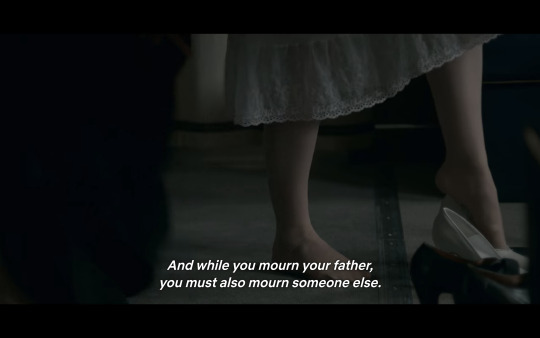
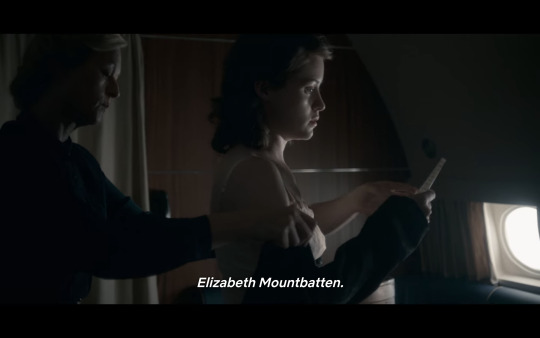
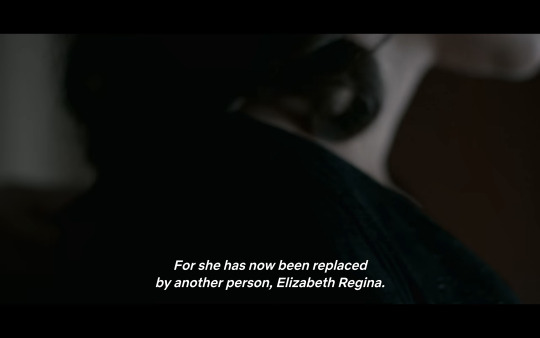
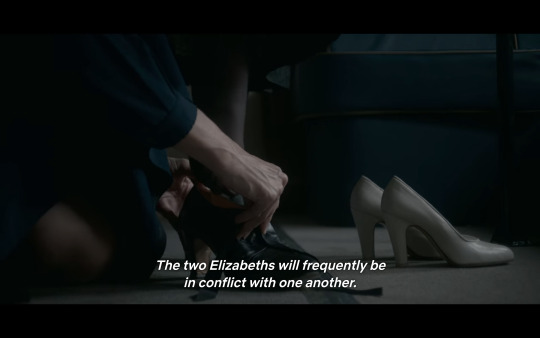
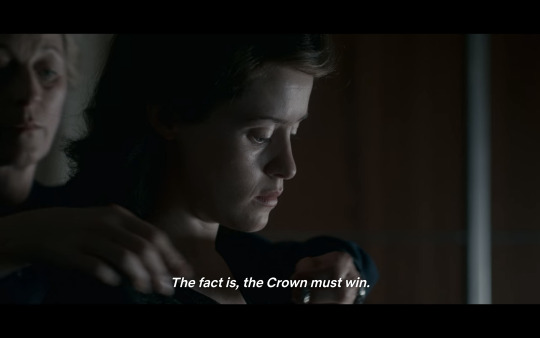
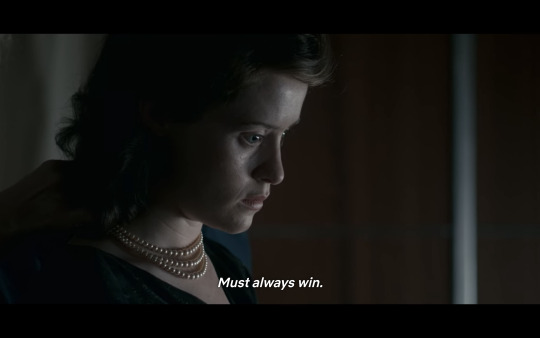
If we were to remove the context of monarchy from this message, it would be read as an incredibly insensitive one. Elizabeth had just lost her dad, whom she absolutely adored. She was now expected to put aside any grief in the name of the monarchy. We see how this is incredibly painful for her. Later in the episode, there’s a heartbreaking scene where Elizabeth cannot bear to see her father’s body. When she finally dares to take a a peek, the sight of his corpse sends her into sobs. The entire set-up seems absolutely tragic. Yet in the show, Elizabeth Windsor dies so Elizabeth Regina can live. The Crown frames this as a noble sacrifice. One that she makes for her people, almost akin to the Passion of Jesus.
We see something similar with Kristina after Erik’s death:
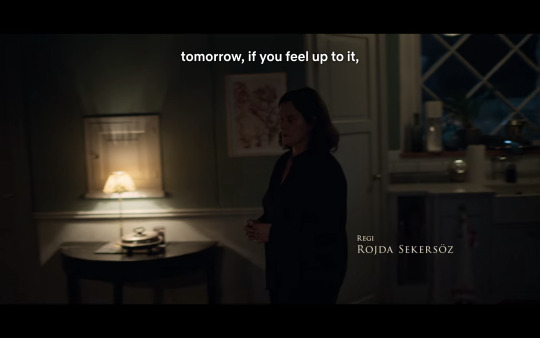

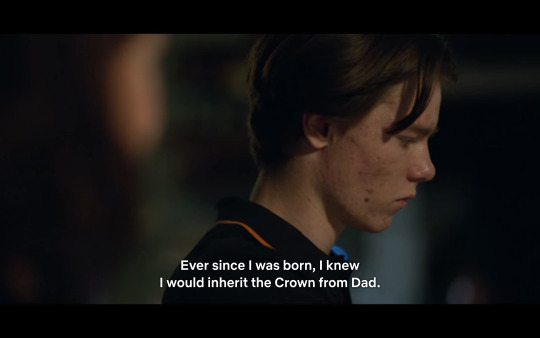
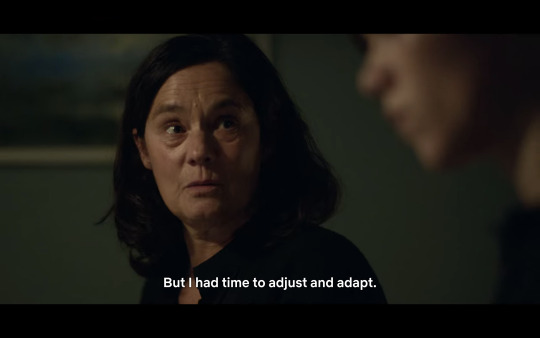
Kristina, the woman, cannot mourn her son. That woman does not exist-- only the Queen exists. Her only concern is that ‘The Crown must win’. In this case, for the Crown to win Wilhelm must adjust to his new role. Like Elizabeth, we know this is incredibly painful for Kristina. We see the pain and anguish she is trying to repress. She’s unable to have more than a single bite of food.
But Young Royals isn’t framing this as noble, but as sad and uncomfortable. Still, for the rest of the episode, Wilhelm tries to embrace the idea that ‘The Crown must in. He tries to mourn Wille so he can become Kronprinsen. But His grief, his anxiety, his longing for Simon prove to be too much for him and by the end of the episode he renounces this sacrifice.
The Crown also shows us a Crown Prince struggling to sacrifice himself for the monarchy. Charles and Wilhelm’s storylines are also very similar to each other (Wilhelm, sweetie, I am so sorry... It’s absolutely true, but I’m still sorry).
Charles and Wilhelm are constantly struggling to choose between love and duty. Choosing love means choosing Charles Mountabtten-Windsor, choosing Wilhelm the Man. Their duty is to kill those men and become the Prince of Wales and Kronprinsen respectively, but neither one of them is capable of following through with this sacrifice. Their inability to fully commit to either the monarchy or their desires drives them to dishonesty and infidelity. But even when they try to comply to The Crown, they’re unable to get over Camilla and Simon:
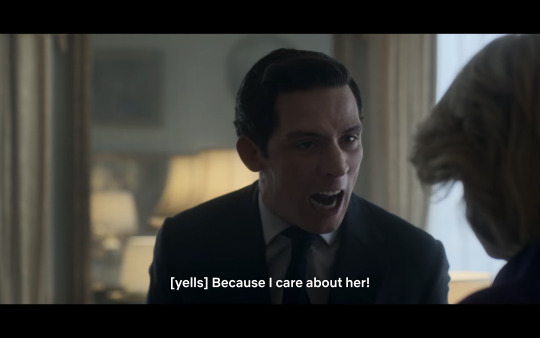
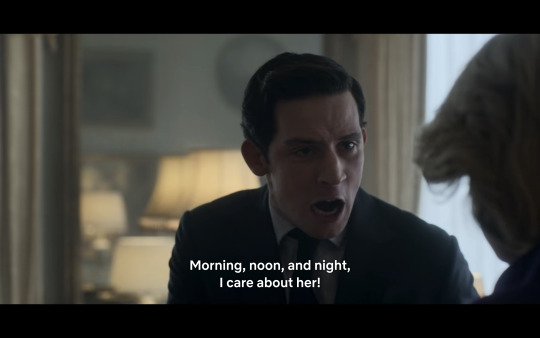
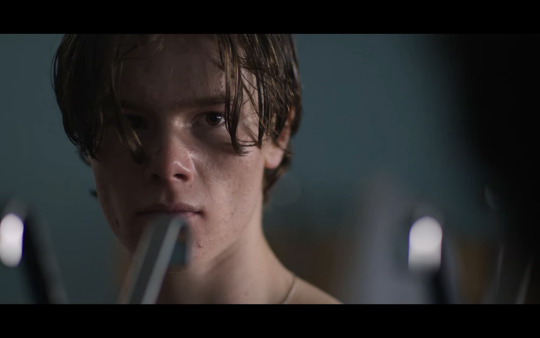
In both shows, we get a big confrontation scene where each Prince informs their Queen that they want to choose love. In The Crown, Charles informs his mother that he’s suffering in his marriage and that he wants to separate form Diana. The Queen outright refuses this by claiming that it’s not Charles and Diana who are suffering, but the people who are forced to watch their disastrous marriage:
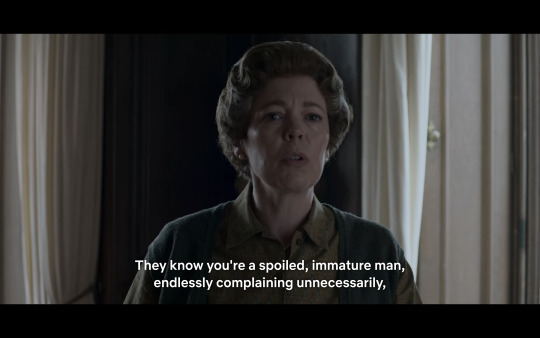
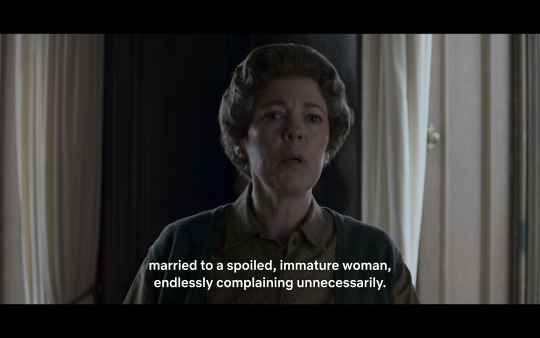
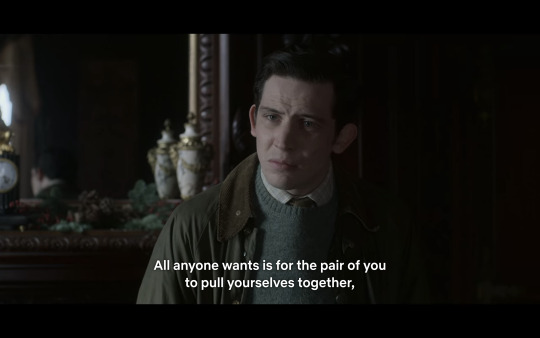
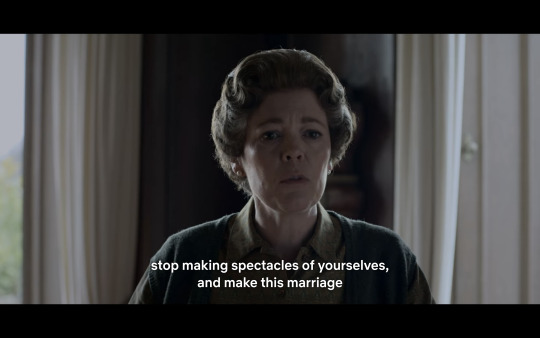
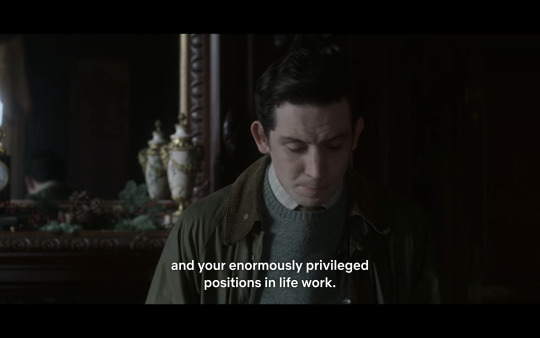
This resonates a lot with Kristina’s comment to Wilhelm in episode 6:
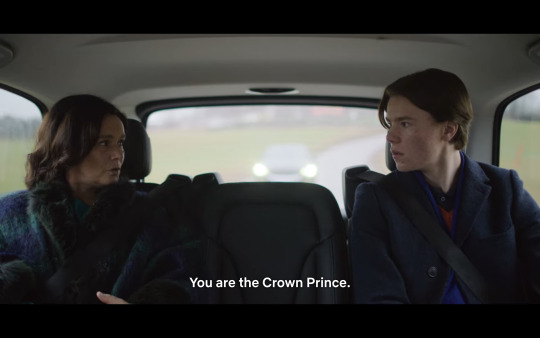
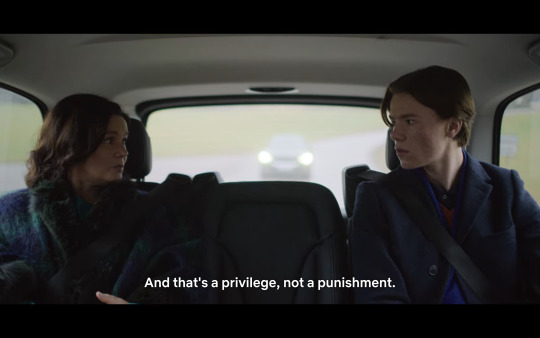
Both Queens accuse their sons of being selfish and blind to their privilege. Elizabeth doesn’t even criticize her son’s actually reproachable behavior, but his inability to behave how people expect him to. Again, if we were to remove the context of the monarchy these would be pretty unfair things to say to your son. But these are not mothers. They are monarchs that had to kill their own selves for the Crown. And as the both of them see it, ‘The Crown must always win.’
Once again, the big difference between the two scenes comes down to framing. Although The Crown asks the audience to understand where Charles is coming from, it nonetheless presents him as lesser than his mother, who despite the difficulties still became Elizabeth Regina. As I mentioned before, The Crown tells us this is a sacrifice done for the people. And like his mother, Charles must suffer for the benefit of the people. That’s the Christ-like Passion of the Monarchy.
In Young Royals, Wilhelm ultimately acquiesces to his mother. But rather than him fulfilling a noble sacrifice, this choice is framed as a betrayal. It’s a betrayal of Simon, but also of himself. It’s also a betrayal of Wilhelm by his own mother, who choses to protect the monarchy over her only living child.
Beyond the framing, there is another key difference between how each show presents the idea that ‘The Crown must win’. The Crown justifies this belief by arguing that Elizabeth’s sacrifice is done for the people of the UK and the Commonwealth. The show does question if the monarchy is truly being of service to the people. Nearly always, the show answers this with a yes. And as long as it’s for that purpose, all of Elizabeth’s sacrifice is worth it.
In Young Royals though, this question is missing. I think this is choice was deliberate. We see that the public are interested in the Royals in the same way most people are interested in celebs. But we receive no in-story justification for why this institution must prevail, no Swedish public that is wanting or in need of a god-like monarch to sacrifice themselves for their sake.
Of course, we still don’t know in which direction this story is going in regards to the monarchy. But from what we’ve seen so far, Young Royals is taking this idea of ‘The Crown’ must win’ and turning it into : but why must the crown win?
#Young Royals#comparison#The Crown#queen kristina#prince wilhelm#catch me again on that anti monarchy bs#WILHELM IM SO SORRY I'LL NEVER COMPARE YOU TO CHARLES AGAIN#also how do we get all these actors in one project togehter#the talent#my post#mg says#my analysis
106 notes
·
View notes
Note
are there any sources that say how lafayette reacted to the death of washington and his other friends from america??
Hello Anon,
yes, we do know La Fayette’s reaction - pretty exactly actually. George Washington died on December 14, 1799 and La Fayette wrote to Washington’s widow, Martha Washington, on February 28, 1800. The letter is today hold by the Digital Collection from The Washington Library.


Dearest Madam
My Heart Has for So Long a time and So throughly Been known to You, that I Need Not, Nor indeed Could I Express the feelings Which Over Whelm it—While the world is Mourning, and Mankind weeping Over the irreparable Loss, What Must it Be to You, My dear Madam, the object of His Love, the Companion of His Life, the partner of His Sentiments, the Happy witness to All His private and public virtues? What Must it Be to me, Who from My Youth Have Been Blessed with His paternal Adoption, and Who Ever Have deserved it By the Most filial Affection for Him and for You, Who United in Every thing were particularly So in Your kindness to me? - Continue, I beseech you, to Honour me with this Maternal Predilection, the more necessary to me, as in you, dearest Madam, I Both Love and Revere What Remains of My Respected and Beloved General - My Mind is so wed to introduce Him in every thought, every Sentiment, every Concern of Mine that I Hardly Can Believe that, While I am Living, He Has left us, Nor Could I forgive Myself No to Have personally received His Last Blessing. Had I Not the Remembrance of the Advice By Which You know He Has Repeatedly differed My Departure for America - the Circumstances are Coming on Which Had appeared to Him to proper- for Our Meeting - But Alas, in this World We Can No More Meet! I would think it for me a Sacred and Staeing[sic] Duty to Go Over and Mingle My Tears With Yours, Had I not Lately Reentered My Native Country Where, although I Live in perfect Retirement, and With not Have Any thing to do With public affairs, I am Bound to forward the Business of My friends, Several of Whom, Who followed me in 1792, are to the paine[sic] of Being Restored to their Homes and families - I owe it also to My Creditors and Children to pick up the Remains of My fortune - My Son, not Less a partaker in My Grief than in My Obligations and Gratitude, Has the Honour to write to you, and would Have Gone to Mount Vernon, Had Not the Continuation of the War engaged Him in the Military Senite where He expects to Be Soon employed - But we Both Live in the Hope to present You Again, dearest Madam, the personal Homage of our Respectful Love; and everlasting Regrets Shall ever Make us worthy of the parental affection which from the Greatest and Best of Men, which from You, Dear Madam, we Both Had the Happiness to experience - My Wife, With a Mourning, affectionate Heart, joins in My Sentiments, and as well as the Rest of My family Beg to Be More Respectfully, tenderly Remembered to You - Be pleased to let me Hear from You as often as You Can - permit me to Hold with You the Correspondence I Had with My Beloved General and think often of that adoptive Son of His who with dutiful Respect, and warm, Grateful, filial affection Has the Honour to be
dear Madam
Your obedient Servant and friend
Lafayette
Martha Washington replied to La Fayette on October 31, 1800:
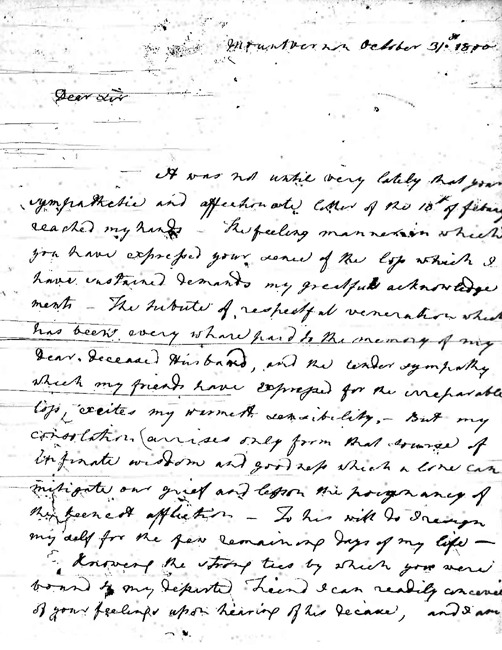
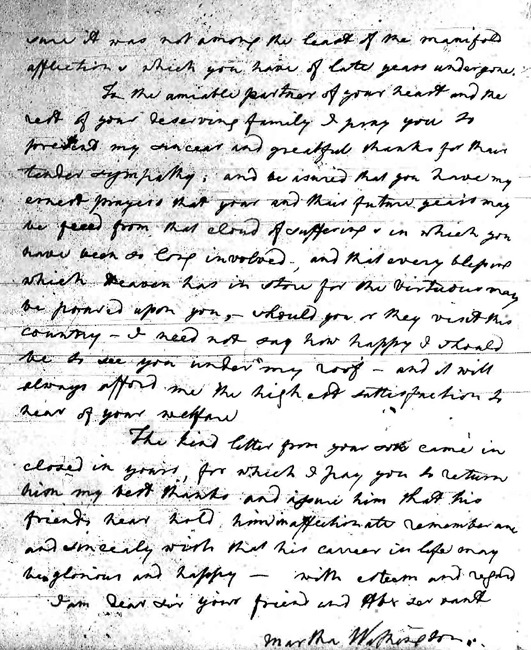
Mount Vernon October 31st 1800
Dear Sir
It was not until very lately that your sympathetic and affectionate letter of the 18th of febary reached my hands - The feeling manner in which you have expressed your sense of the loss which I have sustained demands my greatful acknowledgement. The tribute of respectful veneration which has been every where paid to the memory of my dear deceased Husband, and the tender sympathy which my friends have expressed for the irreparable loss, excites my warmest sensibility, -- But my consolation arises only from that source of infinite wisdom and good help which alone can mitigate our grief and lessen the poignancy of the keenest affliction -- To his will do I resign my self for the few remaining days of my life - Knowing the strong ties by which you were bound to my departed Friend I can readily conceive of your feeling upon hearing of his decease, and I am sure it was not among the least of the manifold afflictions which you have of late years undergone.
To the amiable partner of your heart and the rest of your deserving family I pray you to have my sincear and greatful thanks for their tender sympathy; and be isured that you have my ernest prayers that your and their future years may be freed from that cloud of suffering in which you have been so long involved -, and that every blessing which heaven has in store for the virtuous may be showered upon you,- should you or they visit this country - I need not say how happy I should be to see you under my roof - and it will always afford me the highest satisfaction to hear of your welfare
The kind letter from your son came in closed in yours, for which I pray you to return him my best thanks and issure him that his friends hear hold him in affectionate rememberance and sincerely wish that his career in life may be glorious and happy - with esteem and regard
Im dear sir your friend and obedient(?) servant.
Martha Washington
There is something special about this letter. Martha received at least 55 letters of condolences that we know of, more than 40 of the people who wrote her received a reply - but most of these replies were not written by her but by others, Tobias Lear for example, in her name. La Fayette’s was one of fife identified persons who received a reply written by herself. Martha also send La Fayette two pistols, that Washington bequeathed to the Marquis in his will. Washington wrote in his will:
“To General de la Fayette I give a pair of finely wrought steel Pistols, taken from the enemy in the Revolutionary War.”
La Fayette’s son, Georges Washington de La Fayette, also wrote Martha. He enclosed his letters in the letter written by his father. Beside these letters, there is also an earlier account that illustrates La Fayette’s thoughts about Washington’s demise. Shortly before La Fayette sailed for France in 1784 after his third visit to the United States, Washington wrote him the following on December 8, 1784:
“In the moment of our separation upon the road as I travelled, & every hour since—I felt all that love, respect & attachment for you, with which length of years, close connexion & your merits, have inspired me. I often asked myself, as our Carriages distended, whether that was the last sight, I ever should have of you? And tho’ I wished to say no—my fears answered yes. I called to mind the days of my youth, & found they had long since fled to return no more; that I was now descending the hill, I had been 52 years climbing—& that tho’ I was blessed with a good constitution, I was of a short lived family—and might soon expect to be entombed in the dreary mansions of my father’s—These things darkened the shades & gave a gloom to the picture, consequently to my prospects of seeing you again: but I will not repine—I have had my day.”
To that La Fayette replied on December 21, 1784:
“I Have Received Your Affectionate letter Of the 8th inst., and from the known Sentiments of My Heart to You, You will Easely guess what My feelings Have Been in perusing the tender Expressions of Your friendship—No, my Beloved General, our late parting was Not By Any Means a last interview—My whole Soul Revolts at the idea—and Could I Harbour it an instant, indeed, my dear General, it would make me Miserable (…)”
On February 8, 1800, France held an official funeral service for George Washington. Everybody expected La Fayette to give a eulogy to Washington but that did not happen. More so, La Fayette was explicitly excluded from the funeral. Why? Because Napoléon Bonaparte, who had just risen to power, did not felt like it and because he was a bit petty.
As with regard to his other friends in America, there is not as much documentation that I know of. Washington wrote to La Fayette on October 20, 1782 that John Laurens had died.
“Poor Laurens is no more—He fell in a trifling skirmish in South Carolina, attempting to prevent the Enemy from plundering the Country of Rice (…)”
I am sure La Fayette was saddened by his friends death, but I have never seen him mentioning it. Moving on to Hamilton, who died on July 12, 1804, La Fayette wrote Thomas Jefferson on October 8, 1804 that:
“The Deplorable fate of My friend Hamilton Has deeply Afflicted me—I am Sure that whatever Have Been the differences of parties, you Have Ever Been Sensible of His Merits, and Now feel for His Loss.”
He further wrote to George Washington Parke Custis after Hamilton’s death that:
“Hamilton was to me, my dear Sir, more than friend, he was a brother. We were both very young, when associated with our common father; our friendship, formed in days of peril and glory, suffered no diminution from time: with Tilghman and with Laurens, I was upon terms the most affectionate; but with Hamilton, my relations were brotherly.”
Another close friend of La Fayette, Thomas Jefferson, died on July 4, 1826 and La Fayette discussed his death in a letter to James Monroe on November 28, 1826. I sadly have no full access to this letter so I can only tell you that Jefferson’s death was discussed in the letter, but not what La Fayette actually wrote.
I hope you have/had an awesome day!
#marquis de lafayette#lafayette#general lafayette#george washington#martha washington#thomas jefferson#james monroe#alexander hamilton#georges washington de lafayette#adrienne de noailles#adrienne de lafayette#letters#handwriting#1799#1800#1804#1826#ask me anything#dear anon#george washington park custis#history#death#mourning#french history#french revolution#american history#american revolution#1784#napoléon
61 notes
·
View notes
Text
Can we talk about how Sam is as useless at this as Bucky is, really, and it’s massively sweet?
Yeah, I’m writing about Sam because we all love us some brainwashed, century-old assassin endless array of hurt/comfort here but this idea that Sam, because he’s a therapist and not always a crying, nightmare-sweat-drenched mess, is Captain Got It All Together is not truth... because this poor broken-hearted kitten absolutely does not and it makes him so much more of a better-realized, fuller character...
I’m not trying to wade any ship wars here or any fandom strife over the Bucky slant to fic/sometimes erasure of Sam here... I love both of these characters equally and ship them but my point here is that I think that because Bucky’s trauma is more well-documented and, for lack of a better word, “flashier”, that some people might think Sam looks perfectly well-adjusted. By comparison, he probably is but this other, quieter story happening with Sam is necessary reading here if you’ve been sleeping on the complexities of one Sam Wilson that aren’t the ones the show is focusing on more explicitly relating to his lived experience as a Black man in America. (They’re not completely separate either but not only this part of his life.) What do I mean, exactly?
Been wondering how these two are falling in love but can mainly just get it from Bucky’s POV because Sam is awesome and Bucky is sad and need love? Not sure what Sam is getting out of his relationship with Bucky? Not totally sure you ship it but leaning that way? Yeah, pull up a seat because this thing I wrote after Ep 5 here (so spoilers through that) is basically an old-school ship manifesto at this point but comes at SamBucky/WinterFalcon from Sam’s side, rather than Bucky’s. (I have nothing *against* Bucky. I just think you’re missing half the goodness of this show and half the surprisingly tender romance of all of this if you are not focusing on Sam as much as Bucky.) If this interests you, then read on, being forewarned that it’s a little long...
So... Sam Wilson is a sweet, kind, warm-hearted, empathetic, drop-dead gorgeous superhero soldier flying military veteran therapist... whom the canon suggests is Bucky Barnes-level obsessed with his dead former partner (in some sense of the word), Riley. You thought it was just Bucky with the angsty past love? Oh no... oh, no no no....
Consider that Sam’s been back in Delacroix twice now in TFATWS and not once has his sister-- who adores him and who knows everyone in town-- suggested that she call up any one of the at least ten decent single people she has to know who live in the area to take her f*cking *dreamboat* of a brother out. Forget the show putting Sam in like twelve pieces of canon and not throwing a single human (not named Bucky) at him and what that implies-- we all know that Sarah wouldn’t care what kind of human her brother was attracted to and yet she and the entire community of Delacroix can’t seem to find this guy a date. He’s sweet and hot and an Avenger but our Sam’s a monk, you guys... More to the point... they don’t even try. They know better than to try anymore... which says a lot.
Going back awhile now, when Sam met Steve, he was still this equally dreamy and he didn’t even have any Avengers-related problems getting in the way of his potential dating life. He had a normal job working for the VA in DC. Yet, he clearly was seeing exactly no one and while I am willing to admit that pretty much any human would drop everything and follow Steve Rogers around the world, it’s clear that Sam wasn’t seeing anyone at the time because his life was able to be dropped in a second and he also had that file with Riley’s photo at the ready, man. At. the. ready...
He responded to the opportunity to follow Steve with no less need when it came to his own post-trauma-of-war identity as Bucky does. This isn’t to say that Sam is *as* lost as Bucky because it would be hard to out-do the once-brainwashed assassin who has been alive for a hundred years but Sam saw all sorts of hell. He’s a therapist for veterans because he’s had to get beyond *his own* PTSD and he’s really aware of how that is a journey that doesn’t exactly ever end. It gets significantly better and he knows how well it can-- that’s why he can tell Bucky that there is hope of that-- but it is very clear that Sam Wilson is still suffering his own kind of PTSD and his own grief for the death of a guy who likely couldn’t love him the way he needed him to.
I know we don’t know a ton about exactly what Sam and Riley were but I think there is enough to infer that they probably actually weren’t a couple. For one thing, Sarah never mentions him and even if the show wanted to be vague about things, they could phrase it like “it’s been forever since you brought back someone to the house, haven’t met any of them since Riley” or something. There are ways to infer that they were a thing and the nature of it, if the show wanted to do that but all they have suggested so far is that Sam was in love with Riley. We know he and Riley were friends and worked on the Falcon suit project together but what we are getting out of what they are giving to us is that Sam loved him but it’s not clear that they were even a couple. I’d even say the picture of them that he shows Steve and Natasha is supposed to evoke that they weren’t a couple-- it’s of Sam looking at Riley, smiling like he’s the moon and the stars, while Riley is smiling but just a bit and he’s looking at the camera, not at Sam.
In other words, remember Miller’s analogies from school? Sam is to Riley as Bucky is to Steve. I just offended every person reading this who thinks that Steve and Bucky weren’t an unrequited thing *ducks* but I feel like we’re supposed to take from what they give us that Sam knows a little something about being mad for a guy who thinks you are his best buddy but doesn’t look at you in a romantic or sexual way and you feel like you’re dying over it. Sam gets Bucky because Sam *is* Bucky when it comes to this.
If Sam and Riley were just the best of friends, Sam still would have mourned him greatly but it would not necessarily have impacted his love life the way it seems like it might have. I’m not necessarily saying there was no one but this is a man who even when it felt like Steve Rogers-- whom Sam obviously found attractive-- seemed like he was making Sam question whether or not he was coming onto him or just super-nice and making a new fellow veteran friend... even when that was happening, Sam’s response was that he didn’t hate it or anything and he was willing to help Steve with what he needed in this friendly, advice-giving sort of way and maybe they had a thing, who knows, but it was clear that Sam-- a guy who has to be hit on *all the time*-- wasn’t really used to the idea of there being someone in his life. So, he wasn’t letting anyone into his life. He would have had the chance, no doubt. He was choosing not to. Why would you choose not to? If you were grieving the loss of a man you couldn’t get over and you thought that you weren’t ever going to love anyone like that and maybe having someone wasn’t going to happen for you.
Like, imagine Sam’s surprise when The Winter Soldier turns up, nearly kills them all, disappears and they go on the run and he starts hearing Steve’s confessional stories about the guy who was his best friend and in love with him and Steve has literally never said those words aloud because they’re from the *1940s* and he’s felt guilty all this time for hurting him. Steve’s the kind of guy who would feel guilty for not being in love with someone who was in love with him. That’s when Sam, who thought he had more in common with Steve, realizes he’s actually *Bucky Barnes* in this story. He’s the damn Winter Soldier in the Steve-and-Bucky version of him and Riley.
That is how Bucky evolves from “the kind of guy you have to stop” in Sam’s mind to the guy he’s hanging out with in every fight and snarking over the car seats with. He’s like yeesh, I thought I had a few years of this ungodly pain and that was bad... this poor bastard’s been in love with a Riley who could and probably will live until he’s a hundred and thirty. Sam starts getting into this whole antagonist origin story of The Winter Soldier here because he realizes that one wrong move-- one case of being in the wrong place at the wrong time-- and he could have been captured during the war he was in. He could have been tortured like that, so easily, and he knows what it’s like to be tortured by love in that way.
Bucky, for his part, when he begins to get his mind back and more fully remember Steve and his past, takes one look at Sam and is thinking like... that poor SOB... oh, look, it’s 21st Century Me. So, you fell for Steve Rogers, huh? Welcome to the club. We meet every Tuesday at two to discuss being the pining best friend in love with a guy who, in all likelihood, is attracted to both of us but unless Tony Stark can shake loose a bit of the freak in The Star-Spangled Man With a Plan, we’re not getting anything but a most earnest and sincere friendship out of this (and if Stark can’t, no one can....)
Like, Bucky’s Steve love is pretty pure. He wants him to be happy. He’s hurt that Steve doesn’t love him the way he loves Steve but he does love him as his best friend as well and wants him to have what he wants out of life. If that’s going back in time to Peggy Carter (who wouldn’t, really?) and leaving him behind then, fine. He wishes he were still here but he’ll deal but he’s going to be keeping an eye out for the other guy left behind-- Steve’s new modern era best friend person. Bucky’s so gone over keeping Steve safe that he can’t even resent Sam’s presence-- he’s thrilled he exists. Someone good to look after Steve when Bucky couldn’t! Sam Wilson is heaven sent and must be protected at all costs! So frequently from some kid with webbed fingers, apparently!
Sam, meanwhile, is challenged by the dilemma that Bucky appears to think that they’re in the same boat while Sam, who for sure had a little crush on Steve as who doesn’t, has really come to realize that he is far, far more into the tragic one here. He’s so irritated about it. It would be simpler if he just fell for another blond soldier with red, white and blue blood who couldn’t love him. At least he’d just be completely hopeless then but the brainwashed one? The one that thinks he’s horrid but is so good that he can’t even bring himself to be that jealous of Sam when he clearly thinks Sam is sleeping with the guy he’s loved for years?
Oh, Sam’s gone on that one...
Bucky’s still a mess then so it’s harmless enough to just pretend he’s not writing himself into touch-starved Bucky fanfic in his own mind here but when Bucky keeps saving him in different fights? When he catches him looking once or twice. When the bickering is really flirting and Sam knows he means it that way, too? When the poor guy just gets his mind back, they all reunite and go to one battle and then the two of them disappear and miss *five years* of their lives? When then, soon after, Steve is gone, too?
When it begins to feel like *they* are now the story and meant to go through the rest of these things together? I mean, when everyone else is all on about the fate and destiny of it all-- Stark’s big sacrifice being the one way to save everyone, Doctor Strange going on about all the possibilities of the universe on a saving the world level but it so personal to the people Sam and Bucky know, Steve choosing to go back in time because he can and be with the woman he loved and never got to have...
...standing there in the funerals and aftermaths of all of this together, by virtue of being Steve’s Friends Who Aren’t Really Part of This Gang Exactly... are Sam and Bucky. What are the odds that they are supposed to be the rest of one another’s story? Sam was wondering it. He for sure hadn’t felt like this since Riley... he might not have really ever felt it at all before.
Can we just admit that while there’s been some guys in the past-- and it could be rephrased as ‘some people’, as while Sam is written to suggest he’s at least into men, he could be into people who don’t identify as men as well-- but there’s not been someone who has been able to love him the way he’s loved them.
He’s from the South and Black and the show taps into the racism he’s been through as a result. Not obviously in Delacroix, where he feels safe and seen, where people care about him and don’t care that he is not straight, but in other parts. He’s been in the military, where homophobia is still pretty rampant and it’s a culture of a lot of heterosexual machismo. (Hell, the show even has a kind of walking, talking example of a guy everyone knows was the epitome of that kind of culture, even if he’s been broken by that world, too-- John Walker.) It’s not even really clear if Sam is out and, if he is, to whom. He seems to be the kind of person to want to be himself as much as possible and Sarah likely knows because they are close but I’m not so sure that a lot of Sam’s military buddies actually did. He really strikes me as the guy who gets along with everybody and whom everybody loves-- but whom few people actually *know* because he keeps himself (all of himself, not just his sexuality) private from others...
...which is also a hell of a lot like one Bucky Barnes.
Guaranteed they became such fast friends not just from being sort of left with one another in the aftermath of Steve and their attraction but because Sam was amazed to find that Bucky was actually pretty funny and Sam just kept talking to him because while he has-- or had, anyways, before he ran off with Steve-- a ton of people he’d consider friends, he doesn’t really have anyone he’d consider to be a close friend and hasn’t since Riley. Bucky, just still stunned to be free of mind control and that there was another human being talking to him instead of looking at him as a weapon to program to kill, was eager to listen to and absolutely thrilled when he could find something sarcastic to say to make Sam laugh that surprised laugh and light up.
These two damaged couple of guys spent most of this show and the months before it just terrified by how much love they were feeling for one another and were very happy to let any conflict they could get in the way of it-- any excuse to claim they weren’t feeling totally seen and run for the hills back into their own trauma.
It’s not just Bucky doing this. He might have been the one not returning the texts at the start, the one who seemed to be withdrawing more, while Sam was texting him still to check in on him but how quickly that began to flip around by Episode 5.
Suddenly, the brave one is Bucky. It was Sam for the first few episodes-- he was stil trying and so hard, despite not getting what he needed in return and Bucky still sending signals that he wanted him but was happy to still revel in being too damaged and scared to try harder. By Episode 5, though? Bucky’s not only learned to trust himself again, it is proven to be what he was afraid of: not being able to protect and love Sam the way he wanted to and that Sam would leave him. Triggered by the shield as a metaphor for not caring about Bucky, not having a reason to still pursue him, Bucky thought he had successfully pushed Sam away and that Sam would really stop texting because to not do so would be to admit to one another that they wanted to be around one another and this wasn’t just about Steve/Captain America. By Episode 5, Bucky shows up in Delacroix not perfect by any stretch of the imagination but with eyes only for Sam and is every one of Sam’s favorite Bucky Barnes fantasies come to life.
It’s now Sam flipping out. Would you have expected the Sam of the first two episodes to be a babbling mess in the face of a flirty Bucky stretching and claiming it’s time for him to go get a hotel room? To try to be playing it cool but winding up asking him to stay forever and telling him he likes his tight t-shirts in the middle there? To get so nervous that he suddenly is babbling about six toes and flirting with Sarah, showing how jealous he was of Bucky just... smiling and being this guy Steve had said was under there but that Sam had only had small glimpses of so far? If he was gone for the broken Winter Soldier... he’s wrecked by a single smile from this Bucky.
This is the same guy who spent the first few episodes confident to a point of near-cockiness, loving flirting with and teasing Bucky, the one that seemed more well-adjusted and in control of himself. Overall, he is but there’s something there when Bucky shows up and White Wolfs Sam into a sputtering mess who is sending him little glances, as if they’ve switched bodies from the first few episodes. It shows *just how much* Sam is comfortable with Bucky and how rare it is for him because he would react differently to Bucky’s more overt flirting of Episode 5 if how he is with Bucky was his default in life. Instead, we see that some of it is posturing-- it’s the Sam equivalent of lifting heavy things and using power tools. His is the humor (what’s a better aphrodisiac than making the Winter Soldier laugh or flirt back or blush?) and the bicker-caring. We even see where it comes from, in a way. Sam is a soldier-- he knows how to help other traumatized soldiers and when we saw him in his VA group session when we met him, we saw him using that kind of machismo world and its language to communicate with the soldiers in the group. The difference for him with them versus him with Bucky is that he’s also flirting with Bucky. The buddy cop thing is intentional-- it’s Sam’s strategy, it’s been Bucky’s choice to respond to it and they’re playacting it as how they talk because it’s been easier than admitting that they are completely gone on another and just want all the soft things.
Up until recently anyway and now Sam’s reeling from a man he’s fallen in love with showing up and loving him back. Don’t think for a second that Bucky doesn’t know enough by now to know that it’d totally undo Sam but the surprise of it to the audience only really exists if you don’t think Sam and Bucky have anything in common besides their now-gone mutual friend. In reality, they’re endgame.
#tfatws#sam wilson#sambucky#bucky barnes#thefalconandthewintersoldier#marvel#bucky#buckysam#winterfalcon
37 notes
·
View notes
Text
A 4-Part Meta on Good Omens Part 2: Crowley’s Abuse and Trauma
This is 100% going to be a longer series on Goom Omens because I have ALLLL the thoughts on this, #Sorrynotsorry to my followers who didn’t sign up for my blog to turn into a 24/7 Good Omens one.
In Part 1 I wrote about how Aziraphale is constantly being emotionally, physically, and verbally abused by Heaven and the TLDR conclusion is that Crowley’s love for Aziraphale helps heal him from the abuses of Heaven.

Crowley, just like Aziraphale, is also dealing with the consequences of Heaven’s abuse, but it’s being compounded with the abuse, neglect, and trauma he suffers at the hands of Hell and >spoiler< presumed death of Aziraphale. Neither have straight forward reactions to their abuse but ARE on the road to recovery.

In the beginning, there was a garden, a wily snake, an angel on apple tree duty, and a “parental” God. But, before then, before the beginning, there is a fall, a “purge” of angels who ask too many questions and cause too much trouble for Heaven to control through their intimidation and dogmatism. And here, we have the first abuse -- the fall.
Crowley is inquisitive by nature. Before Noah’s flood, we see him investigate the situation and interrogate Aziraphale with a barrage of questions. He knows right from wrong and craves answers for moral questions -- he needs to know what’s going on to protect others. Although we don’t know what specific question caused his fall, we do know that asking questions threatens the authoritative nature of Heaven. No one is allowed to question the “great plan”, as evident by the hostile nature the angels respond to Crowley’s and Aziraphale’s attempts to save the Earth. Stringent, cold, and distant behavior punishes independent thought and, since Crowley needs answers, needs to know how to help, he’s a liability to their hierarchy.
We also know that by the time we meet him, he’s already banished from grace and discarded like yesterday’s trash. He’s already fallen before tempting Eve into knowing the difference between right and wrong. He’s already fallen and already disowned by the almighty and her all her creations. He’s functionally alone, no unconditional love, no support, no reason for WHY what he’s done is bad or not. He’s neglected and isolated.
We’re told several times that Crowley doesn’t really consider himself really fallen, or rather, that he’s sauntered vaguely downward. But, the truth of the matter is that he IS fallen, and we’re told explicitly it’s because he was asking questions, that “[asking questions] was all it took [to fall] before”. And, we can see that 6000 years later, it’s still wreaking immeasurable damage to his emotional and mental health.
Just look at his face when he’s begging to an unbending God who cast him out. He’s not spiteful (although given his treatment, he’s well within his rights to be) but desperate. He’s questioning why everything has to end, why he has to drop his home, his car, his best friend. He’s not mourning his fall (in this gif) but he’s not quite over the implications of being unloved.
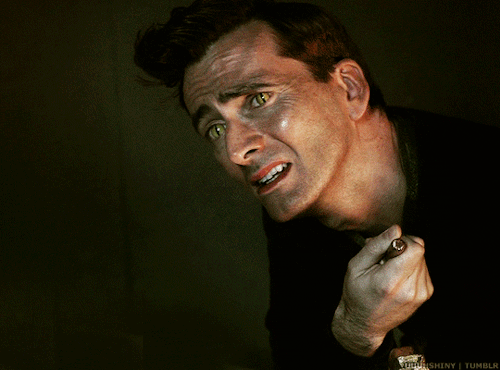
When Aziraphale says he hopes Crowley is forgiven, Azi still has faith that the angels are “good” and that forgiving Crowley would allow them to still be together, fighting for the greater good. Crowley’s immediate response though is that that’s his whole deal as a demon. He says he’s “unforgivable”. The lack of self-esteem is symptomatic of the abandonment he’s experienced. It’s not just that he doesn’t want Heaven’s forgiveness (quite honestly he doesn’t need their forgiveness because it’s not his fault he’s been abandoned, it’s theirs), it that he doesn’t feel like he’s worthy of anyone’s forgiveness. This consequently adds to the importance of Aziraphale’s later forgiveness. It’s not that Aziraphale has been wronged, it’s cementing the idea that Crowley has worth in his eyes. That, with no strings attached, Crowley is loved and cared for, even if Aziraphale’s unwilling to run away with him.

This is further cemented in how he responds to Aziraphale’s “nice” compliment. Unlike the genuine anger he shows the other demons, he ‘s careful with Aziraphale. Now, is it a “nice” thing to do? No. But, he’s not trying to be. Despite this, he’s careful not to hit Azi’s head against the wall, and as the gif below shows, Aziraphale’s got enough time to put a hand back behind him and brace himself against the wall. There are no defensive movements, no attempts to push back or talk his way out of the assault. Although Azi does do that when the Angel’s confront him about working with Crowley, he knows that in this instance, Crowley is reacting to a traumatic trigger. Crowley knows that being nice didn’t save him from falling or trauma after the fact. He’s yet to fully cope with his trauma.
Shoutout to @greenbergsays for their excellent deep dive into this scene and being the first I can find pointing out Aziraphale’s lack of reaction.
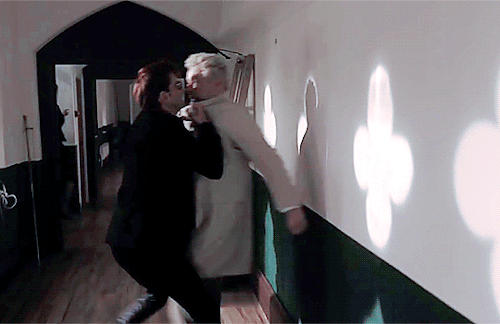
Hell is no better. After being cast out, there is no such thing as unity or support. Despite Crowley being great at his job, getting awards left and right, there is no trust. Hastur explicitly says as much because Crowley acts differently, and once again he’s punished for deviating from the limited acceptable behavior. Beyond the issue of trust, there is no respect and (in the series at least) Crowley’s actual work is not recognized (no, he can’t get a wahoo though he deserves one)

His “side” who he’s meant to be loyal to, meant to help win “the great war” ultimately does not care about him either. He is as disposable to them as he is/was to Heaven.
Which is why he cares so damn much about Aziraphale. THIS is why he works so damn hard to be Aziraphale’s side. Crowley NEEDS a side that cares about him, and he knows that throughout the last 6 millennia, Aziraphale is the only one to see the world like he does; who is as strange and rebellious as he is; who has fallen in love with humanity like he has. Aziraphale loves hard, but also honestly. Unlike Heaven, Hell, or God, there are no strings attached to the love they share. Crowley isn’t secretly trying to manipulate Aziraphale into “falling”, Crowley knows just how important Azi’s identity as an angel is to him and Crowley goes out of his way to affirm and reaffirm Aziraphale’s identity.
The relationship he’s developed with Aziraphale makes walking in on his burning home the worse traumatization post-fall. Look at the pain and anger on his face when he realizes his best friend to be dead. Crowley KNOWS running into that building that the only way for his Angel’s bookstore to be on fire is if Aziraphale is dead or dying. Without Aziraphale, Crowley is alone. Unquestionably, undeniably, permanently alone. Just like when he was in Heaven. Just like after the fall. Just like in heaven.

You can call it what you like, romantic, platonic, best friend, lover, or queer, but the grief at this moment consumes him. His loss triggers the neglect and isolation given to him by God during his original trauma. Once he’s realized, fully realized, that he’s alone without anyone left on his side, he has nothing left to fight for. Look at the grief on his face, he’s mourning, and resigned to the end of the world, because there’s no world without his support system, without his family. He has no one left to help him cope.
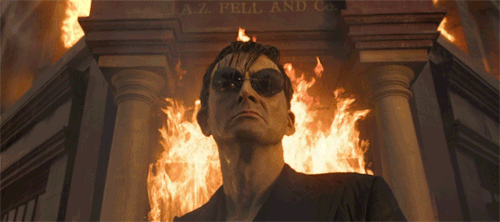
Although, one of the ways Crowley DOES try to come is through his alcoholism. Although both Aziraphale and Crowly drink often, Crowley is more prone to excess and is more frequently getting drunk as a way to deal with tragedy. Although alcoholism has a heavy genetic component, his first response is to any stress is to drink. And, there are several studies linking alcoholism to trauma.
Also, Crowley is retraumatized the same day by the loss of his car, compounding all of the different struggles of the day (the “loss” of Azi, the rejection of Heaven and Hell, the end of the world, his apartment being invaded by murderous demons). Losing his car, his only other reliable companion, his comfort zone, leaves him at rock bottom.
It is only Aziraphale who can help him cope with the losses and redirect on their impending doom.
It is only Aziraphale who can help him focus through the panic of seeing his car burning before him, of ending Apocalypse before it starts, and facing his worst fear -- Satan himself.
It is only Aziraphale, who, despite Crowley’s overpowering resignment to death via Satan, Crowley trusts enough to refocus and come up with a plan to help Adam cause Armaggedon’t.
Which brings me to the final trauma -- his torture. Crowley is aware of the abusive behavior in Heaven, and while he couldn’t have known he would have gotten a trial in Hell (albeit an unfair one), he does not witness it. Instead, he poses as Aziraphale and endures some of the specific psychological torture intended for his best friend. Although he knows he can survive Hellfire, there is trauma in KNOWING his best friend wouldn’t have. There is trauma in being told to shut his face and die. There is trauma in not receiving a trial. (I’ll unpack this more in part 3)

The only thing that enables Crowley to survive, to work through this trauma, is his relationship with Aziraphale. He goes out of his way to inspect the resurrect the book shop, to “tempt” Aziraphale to lunch, to indulge and maintain his best friend. He does things that make the Angel comfortable and does not once lie or violate his trust. Always, he’s on their side. Although he storms out 3 times in the show, he always uses it as breathing room, before once again seeking Aziraphale out, willing to drop everything to run away together.
Since Heaven and Hell have disregarded him, treated him as less than dirt, he approached Aziraphale AS EQUALS. Their dynamic (Which I’ll go into more later) is not on uneven footing, and both parties treat the other with a kindness neither of them is offered by their respective worlds.

TLDR: Aziraphale's love helps Crowley cope with his trauma and their no-strings-attached relationship enables him to begin healthier healing processes despite the abuses of Heaven and Hell.
Thanks for coming to my Ted talk
#ineffable husbands#crowley#crowley and aziraphale#anthony j crowley#anthony janthony crowley#tw: abuse#tw: mentions of abuse#tw: trauma#tw: torture#thanks for coming to my Tedtalk#expect a part 3#meta#good omens#good omens meta#sorrynotsorry#hopefully someone reads this#no I haven't read the book#yet#aziraphale#these two are in love#deep analysis#analysis#the ineffable plan
1K notes
·
View notes
Text
Tales of Berseria Review/Analysis
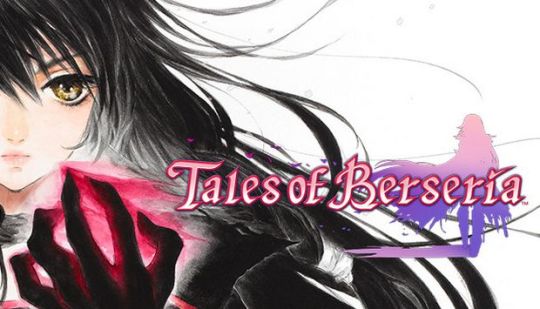
So Berseria is my first Tales game I’ve played, but despite all the praise I’ve heard for many of its titles, I knew I wanted to start here first and foremost. Having not only having the first solo female protagonist and a darker story of revenge kept me glued to the story.
But to go more into the summary:
Many hundreds of years before the events of Zestiria, the continent of Midgand suffered under a terrible curse called "Daemonblight". Ordinary humans and animals became possessed by evil spirits and were transformed into bloodthirsty monsters that preyed upon the living. That was until the day a saviour named Artorius Colbrande appeared and united the world against the bestial hordes that threatened to destroy it. Wielding a holy sword and a philosophy of "reason over emotion", Artorius causes the Advent of angelic malakhim into the world, and leads the Exorcists of "The Abbey" in a crusade to eradicate Daemonblight once and for all.
Yet in a dark prison cell far from human contact lies a woman named Velvet Crowe, whose peaceful life was shattered three years ago in one of the "Scarlet Nights" that used to inspire terror the world over - the same night the rest of the world knows as the Advent. Velvet knows the terrible truth of how Artorius gained his divine strength during that Scarlet Night, an incident that twisted her left arm with daemonic power, left dark scars upon her former kindness... and left her bereaved of her little brother. One night, a mysterious woman, who Velvet suspects she knows, visits her cell. The woman has a proposal: if Velvet can escape from the prison, the woman will help her take revenge upon Artorius. With burning hatred in her heart, Velvet embarks on a quest that threatens to uproot and revolutionize the world order.
If you can’t tell, this game is a prequel to Tales of Zestiria, which I never played, but as I was more interested in this and had absorbed a lot of plot points from mutuals who loved Zestiria I thought I would be fine.
And starting off I was really endured by the cast. As you can see, you kick off the main story breaking out of prison and most of the rest of your party are other outlaws, criminals, and morally ambiguous figures. At first they mainly work together out of mutual self-interest, but after accidentally kidnapping a young Malek, corrupting/raising him begins to bring the party together
I gotta say Act 1 was my favorite part of the game, Velvet is a sharpened sword brought to life living nothing more for her revenge. And her quest brings an actual moral dilemma, Artorius is bring peace to a world on the verge of chaos, yet what is that peace worth if it came at the price of an innocent life? Is it worth burning down the rest of civilization to get vengeance for her little brother?
Aside from this, her growing her growing relationship with Laphicet, the young Malek is also interesting, in a fit of trauma she named him after her younger dead brother and the sibling-like bond they develop make it seem as if she is taking out a lot of her grief through projecting onto him, it’s all fascinating stuff
However I found things started to drag for me during Act 2, plot-wise we have to take some time from directly pursuing the revenge plot bc Artorius is too strong atm, and i understand that out of universe we need to give time to explore the rest of the cast, still this really hurts the momentum of Velvet’s arc
And while I enjoyed the rest of the cast, none of the stuff we got focused on them ever felt like it reached its full potential whether individually or game-wide, part of this might be my fault as it seems there might have been some side quests i missed (although I tried to stay on top of most of them and what I got never seemed to be very necessary for getting the main plot) still i feel like if you’re going to make me run all across the world it shouldn’t be that hard to weave more in, there’s just a lot of focus on past backstory rather than active story moments which is frustrating on top of what I previously mentioned
Going into Act 3 spoilers, things did pick up, until then I had tried to construct a consistent morality of the game and came up with the idea that, “sacrificing for the greater good isn’t inherently wrong, but often those who are asked to sacrifice had no choice in the matter” the plot twist of Laphi having been in on the sacrifice and now acting as Innomenant really was great, shaking both the narrative and Velvet, making almost all the pain and hurt she had inflicted on the world for nothing.
The moral ambiguity gets a little simplified when the stakes escalate to world-ending levels, while it fits in with the other themes of independence and free will, it does make our group that gleefully dragged small children with them on assassination attempts into undeniable good guys, not a bad choice but it does leave most of the rest of the narrative pretty straight-forward
I also feel like i never got a good grasp on the lore, like part of this is also me looking stuff up, but Melchior and Artorius seemed to be not human or very old and apparently followed that Claudin guy, but i don’t know if Innomenant was always their main goal or what
As for the actual ending, this is when I really felt like it would be more emotional if I had played Zestiria before bc a lot of stuff felt as if it should have been more meaningful
Ranking the Cast:
1) Phi: the beating heart of the narrative, bringing everyone together and growing into such a strong person, like i said the highlights of the narrative was both his slow “corruption” and then how he matured and began to stand up for himself, his speech to Velvet in the Earthpulse was 10/10
2) Velvet: what can I say, give me a morally ambiguous lead girl and I am hooked, i feel like they did a good job of balancing out her closed off new nature by giving the audience just enough information to know how she must really be feeling, which made her more than just “angry and revenge” focused, but I feel like bc of the break in the 2nd act a lot of the immediacy of her trauma and desperation was kinda lost
3) Magilou: a fun character that worked as comic relief a lot of the time, but the teases about her backstory/true nature were great, and I especially love her scene where she single-handedly holds back Melchior to save the rest of the party, still this is where some of the “only getting to hear backstory” stuff really began to drag on me
4) Eleanor: a good foil for Velvet and solid member of the party, adds good world-building, however I was less invested in her development bc a lot of it was centered around Kamoana who just irked me, after getting such a good kid character with Phi, she was just so baby-ish and ended up dragging Eleanor down
5) Eizen: Nothing wrong with his character, but i feel like he definitely would have meant more to me if i was more familiar with Zesteria, contributed to the themes and had a nice relationship with Phi, but I again a lot of his more personal character moments just weren’t delivered
6) Rokurou: As a character I like him, especially in Act 1 his relaxed personality is good for the party’s chemistry, I just could not get into his arc at all, there’s just a lot of generic ‘I need to get stronger vibes’ and what pathos surrounding it isn’t really utilized the most effectively, like in a game all about family and people going to insane means for them, the fact he just really wants to kill his brother should be a big deal, but while you can read between the lines about likely having a pretty shitty childhood but again I wish we had seen more of that on-screen stuff, for a guy defined by his anger, we don’t actually get a lot of it explicitly which makes it hard to connect,
Also with the ending, I knew Velvet had a tragic fate and I feel like her sacrificing herself was fitting, I guess just the way the last cut-scene was shot gave everything a happy and triumph tone which didn’t really fit, Velvet’s fate seems pretty shitty and so at least getting to mourn that/a more tragic but necessary tone would have made it slide down easier
Overall I may seem so critical was bc I really wanted to love this game, and while it didn’t deliver everything I want and fall into that adoration camp, the fact it left with so much to talk about is definitely worth something
#seasalt talks#my reviews#tales of berseria#i'm really interested in seeing where my takes fall in with the rest of the fandom
13 notes
·
View notes
Text
Fetch is iconic because to read Fetch is to suffer. I say that with the warmest regards to Tam. It's an example of the medium as both a challenging, cathartic, and escapist one.
Name/Handle/Alias
@secretreylo SecretReyloTrash
About how long would you say you’ve been rooting for Reylo?
When it comes to smut I tend to go two directions: "Shipping" it or a hypothetical "They'd Be Hot Together". I've been on that TBHT train since TFA, but not contributing and only casual browsing of smut because that's what TBHT is for. Spring of 2018 was when the mediation of how to realistically get these two together, the meta aspect of shipping, really started to appeal to me because of stories I was reading ("Lilies" by diasterisms was my first Soft Ben and I loved him) and I gave writing it a try with Perfumed in Obsession, a story that is 100% mediation of opposing viewpoints. I fell very far, very fast into it.
What did you think of the way Rise of Skywalker handled Rey and Kylo’s relationship?
Really gross. TLJ was a very sensitive text. It's not about physical force; it's about persuasion. Understandable viewpoints, where they both offer so much of themselves and it still doesn't work, and that's really heartbreaking and compelling. TROS felt like it had taken several steps back. Kylo was more of a bullying, negging presence when before he'd respected Rey's power and autonomy before, he just had hopes about what she'd do with it. now he's controlling. He withheld crucial information about her trauma, which is deeply wrong. He was a generic villain and Rey was physically fighting her way out. Their ending wasn't given space to breathe or feel like something was happening, and then he drops dead in her arms. A lot of simpering was done on the filmmakers part about what he deserved by Rey doesn't get anything she deserved. Their only interactions before the Exegol Disaster are only focused on drudging up pain and hostility, so there's no moment where they "see" each other that matches TLJ. The final battle there is some grasping at recognition, but it's really imbalanced towards Ben's redemption, Rey being rewarded for essentially waiting out his bad boy phase, and nothing to address her anger and grief and darkness. It tipped the scales way out of Rey's favor, and she's an important character!
Do you think the film understood why you, and other people, felt like Rey and Kylo had something together? Did it get their chemistry?
No, it really felt like the conversations between them were missing the point. Negging, withholding, leveraging. These were two flawed but honest people (at least with each other) who had a lot of circumstantial baggage that kept them apart. Ironically a lot of the "hero" and "villain" posturing gets stripped away and they are shown as their truest selves through the bond. Finn never sees this side of Rey. Snoke never saw this side of Ben. It's a relationship that mattered because it was so nuanced that way. TROS Rey being stalked by Kylo in his Supreme Leader Helmet seems antithetic to the sincerity of the relationship. It's telling that one of Rey's lines is a generic, cliche whisper of "No": it falls horribly flat because a conversation can't just be "Yes." "No." "Yes." "No." I constantly bring up TLJ in my answers because it's what solidified my love for this ship, but their conversations that Rain wrote were a compelling back-and-forth that filled in their arguments with detail that made the arguments appealing. What about the handling of Kylo’s redemption? Was it something you had to think through in your stories?Here's the thing. I wanted Bendemption to be painstaking, bittersweet and maybe not even completed in full by the ending (but explicitly in the works). Here's where the mythology of TROS gets really wonky, and why I think fans are so upset: If Ben was mentally infiltrated and groomed by the most powerful Sith Lord in the Galaxy for 9 movies, can we actually have a nuanced conversation about what he deserves? No. We all just want to wrap a shock blanket around him and let him have a nap, which, fun fact, is the actual ending of the Exegol Metlife Stadium Battle. My point here is that TROS took his accountability, his toxicity, and his choices and rendered them meaningless. It is way too extreme. What does he have to atone for if Palpatine ruined the lives of every Skywalker so thoroughly that he never stood a chance? I adore the self-sabotage of his character. I adore that he is his own antagonist. I adore that he faces consequences for his toxicity and that his love for someone leaves the ball in his court to Fix His Shit for the potential of his own goodness. But you take a situation and make it so tragic where he was so weaponized and powerless that I'm actually impressed he only killed Han. I liked when his actions actually had weight. I adore him for how his emotions compromise his happiness and how damaging it is that he doesn't deal with them because I see so many parts of myself. Step one or writing Redemption was always facing those emotions. I love writing Ben throwing himself at his father's, his mother's, and Rey's feet and just letting these repressed emotions out, and their capacity for forgiveness sheltering this change. It didn't need to be completed by TROS but it needed to be started.
What did you think of where Rey landed at the end? There had been a lot of excitement around Star Wars having a female protagonist. Do you think she lived up to the promise of her character?
Rey's ending devastated me. It was a period of active mourning that went way beyond Ben's death for me. You know when you pick one phrase when you cry and just fixate on it? "She's alone" was mine. For days. That was all I asked for from this series. For Rey to find her home. Rey was stripped of so much, and most insulting was the fucking Skywalkers playing keep away with her own backstory until it was convenient for them made it seem like they were the actual villains. Why did she have to go in ignorant? Why did we retcon a girl coming from a shitty family and excelling despite that? Symbolically, now she as a character is most alike to Shmi, and that makes bile rise in my mouth. A single woman on Tatooine, dressed in her Virgin Whites, waiting for the Force to decide what to do with her? Smhi. It's Shmi. Here to immaculate concept some more important sacred Skywalkers. Because if she's a Skywalker, there's gotta be more, or what was the point? Thanks, I hate it.
There’s criticism of the movie that argues it’s akin to “fan fiction” and that is has too much fan service. As fans and fan-fiction writers, how do you react to that?
No; it's too corporate. Fanfiction has a love for the source that constitutes the FREE effort to write for it. I think the comparison to fan fiction labors under the assumption that fan fiction is lazy and bad: when the most popular stories that do incorporate high levels of drama earn them through painstakingly hard work. Fetch is iconic because to read Fetch is to suffer. I say that with the warmest regards to Tam. It's an example of the medium as both a challenging, cathartic, and escapist one. It had very real feelings and a happy ending that was earned in a trial by fire. TROS instead was pure studio interference. It was trying to please *everyone* instead of someone earnestly saying "this is what I love." There is no joy. Just cynicism and punishing people who were sincere. I can't validate its need for me to love it. It's desperate and sad.
Are you still writing any Star Wars fanfic? Tell us about it! (Don't forget your Ao3 handle!)
Yep. I will be updating my newest story "The Witch and The Holocron" every Saturday. It is the closest I will get to a Miyazaki Movie. I'm still on my WIPs: Soldiers in Petticoats is due soon, Virtue Rewarded requires an extensive amount of time but it's in progress, I really want to pre-write my Romanov Imposter AU before posting but I'm excited for it. I'll be around. We all know how bad I am with WIPs but I'm still enjoying writing. We'll just pretend TROS never happened.
Thank you Secretreylotrash! you can find their writing here: https://archiveofourown.org/users/BadOldWest/pseuds/SecretReyloTrash
14 notes
·
View notes
Text
Dalek and the Doctor
@torchwoodwho I made an observation a while back on a blog post about “Into the Dalek” about the Doctor and comparing him to Daleks. I noted that into the Dalek falls flat for me, and felt like a rehash of things we’ve already seen.
I’m going to look at “Dalek,” “Daleks in Manhattan/Evolution of the Daleks,” and “Into the Dalek” today. When are Daleks compelling, and when does comparing the Doctor to a Dalek hold weight?
ETA: this has turned out to be very long, so I’m going to split it up into at least two posts. This one is about “Dalek.”
I’ve only gotten close to being disturbed three times while watching Doctor Who, and two of those were cybermen episodes (playing on a real fear of people doing something to you while you are powerless over your own body). Yet Dalek is also my favorite episode of New Who. Why?
The Randomwhoness blog said it better than I can:
“To directly compare the Doctor to a monster is rarer, but that’s what Dalek does, through role reversal. The Doctor for instance, played with saliva propelling emotion by Eccleston, behaves in a very un-Doctorly way. Upon first discovering the Dalek, the Doctor does not do any of his normal tricks. He doesn’t negotiate or befriend or cajole. He just tries to exterminate it. The first instinct of a Dalek.
The Dalek meanwhile demonstrates its Doctory ingenuity at every turn. It absorbs energy from Rose and escapes by tricking its enemies into a false sense of security before suckering their faces. Its next step is to absorb information. ‘The Dalek’s a genius,’ the Doctor warns. So just like him then, but murderous. Oh, he’s that too now.
For the rest of the episode, the Doctor is largely impotent. He can merely react to what Dalek does. It’s his own tactic turned against him....
...This culminates in a famous scene where the Dalek chooses to destroys a room full of soldiers by setting the sprinkler system off and electrocuting them with one zappy shot. It’s interesting because there’s no plot reason for it to show such an innovative approach to death; we all know it could just pick off those guards one by one. It chooses the showy way of killing, presumably as a display of strength and to terrify any onlookers. It certainly seems to work on the Doctor, who ends up bawling at the screen...‘why can’t you just DIE?!’ But this is surely the Doctor’s modus operandi: come up with a clever solution which not only does the job but underlines your point....
...By episode’s end, the Dalek has used guile and intelligence to work its way to freedom, and stands at the finale with the spunky girl by its side. The Doctor on the other hand has resorted to wielding a big gun. Rose says to him, ‘What the hell are you changing into?’ making the implied point explicit. As it turns out, the story’s conclusion has very little to do with him. The Dalek commits suicide with Rose’s consent, while the Doctor is reduced to a bystander. In a strange way, the Dalek has won, while the Doctor has failed at every turn.”
From: https://randomwhoness.com/2014/12/19/the-monster-the-doctor-and-dalek-2005/
“Dalek” makes an effective comparison between the Doctor and the Dalek because it uses more than dialogue to make the comparison.
Another fantastic element of Dalek is how sparing it is. Nowadays we’re used to hordes of Daleks in season finales. Those tend to be big, galaxy-ending battles that are thwarted clever solutions, since Daleks don’t seem to take casualties like ordinary armies (in fact, we never see them being clever when they’re out in full force. They seem to be scary only because they can take you down, but you can’t reciprocate).
In “Dalek,” we see just one Dalek, and in it, the Doctor has met his match. They’re confined and racing against each other. The equal weight and the power of just one Dalek makes Daleks at large infinitely more intimidating. Precision can pack just as much punch as an onslaught.
The whole episode is structured around the contrast, and its purposes (beyond introducing an old villain in a fresh way) include revealing something fundamental about the new doctor’s character.
So, I love Eccleston, and I love the 2005 season. “Dalek” challenged everything I thought I knew about the Doctor: that he was incapable of looking for a violent solution. Up until “Dalek,” the doctor was a survivor, a refugee of sorts, drifting through space and mourning his people, lost in the war. He looked for solutions that kept people alive, and seemed to genuinely regret casualties, even when the dead had tried to kill him. Then “Dalek” changed everything.
I did a quick look through transcripts, and “Dalek” is the first time the Doctor reveals that he ended the Time War. Before that, we’d figured out that everyone was dead and he was the last one, and that he tried to save them, but not that he was the direct cause of their deaths. But before he admitted that, we watched him seethe with anger and pain. We watched out previously killing-averse Doctor jump to torture and murder, and not after a long, on-screen provocation, but as soon as he found out what the Dalek was. As a new viewer, I didn’t really know what a Dalek was, but I wanted to know what could possibly make the “It’s a different morality. Get used to it”-Doctor that distressed. I was disturbed, both by what the Doctor was doing, and by what could have made him that way. I didn’t know what he was going to do next, or what he was capable of. I also hurt seeing him in that much pain.
In this episode, Rose doesn’t see any of this. All she hears is the Doctor defending her after he thought she dies, and keeping everyone alive as the Dalek approaches. She doesn’t watch the Dalek murder a roomful of people. By contrast, what Rose does see is a Dalek that’s just slightly human, one that’s “beginning to question itself,” enough to pity it.
Of course she’s horrified by the Doctor we see at the end, who wants to kill it. She hasn’t seen any of the grief and pain that the audience has seen. When she says “What the hell are you changing into?” we know both sides of the story. We know the Doctor is much more like a Dalek than we thought, but we’re not condemning him for wanting to kill it because we finally understand why he’s going around with such a weight of guilt.
To recap: when Dalek compares the Doctor to a Dalek, it does do effectively because we are shown, not told, the depth of the Doctor’s hate by his reactions, because of a sudden contrast in his behavior in previous episodes, and because the Doctor is structurally compared to the Dalek across the whole episode by reversing their roles.
For my last point, I want to look at what moral pronouncement we give the doctor as a result of the episode. Comparing the Doctor to a Dalek is always supposed to shock us, since the Doctor’s a life-defender and they’re robot exterminators. As the audience, it’s up to us to answer the question “Is the Doctor just like a Dalek?” and why we answer no is best illustrated by the placement of the two lines that explicitly compare the Doctor to a Dalek.
Mid episode, right after the Doctor’s explosion of temper:
DALEK: You would make a good Dalek.
End of episode:
ROSE: ...What about you, Doctor? What the hell are you changing into?
If the whole episode is about comparing the Doctor to a Dalek, why is the Dalek’s line at the beginning-middle of the episode?
Because this episode is about more than Daleks. More than them, it’s about who the Doctor is. We’ve gotten little hints and followed the breadcrumbs to figure out what the time war was, but this episode takes off his bandages to show us the raw wounds still there. Like Donna in the Sontaran Stratagem, we don’t really know who the Doctor is, and not knowing could be dangerous because we don’t really know what he’s capable of. We assume he’s a good guy because we haven’t really seen him do evil--all deaths around him have happened as willing sacrifice (Jabe the tree, Gwyneth), by the hands of others, or in hands-off, retaliatory justice fashion (the Nestene consciousness, the Slovene, Cassandra). He had never pulled the trigger, so to speak. Now we know he has done so before, and will do it again.
We saw his explosion of pain-fueled rage at the Dalek, and it was shocking. When the Dalek calls him on it, we’re inclined to agree, and yet we can tell there’s so much emotion and guilt underneath it, something a Dalek is incapable of.
Between that line and the ending, what happens? We watch the Doctor suffer fresh grief as the closest thing he has to family dies again, right before his eyes, at the hands of a Dalek. When he realizes she lives, he has a chance, in a way, to live it all over again. What does he change when he gets a do-over?
DALEK [on screen]: Open the bulkhead or Rose Tyler dies.
DOCTOR: You're alive!
ROSE [on screen]: Can't get rid of me.
DOCTOR: I thought you were dead.
DALEK [on screen]: Open the bulkhead!
ROSE [on screen]: Don't do it!
DALEK [on screen]: What use are emotions if you will not save the woman you love?
DOCTOR: I killed her once. I can't do it again.
(The bulkhead opens. Rose and the Dalek walk through.)
He releases a Dalek to save someone he cares about, to hell with the consequences. This choice is key to the Ninth Doctor’s character, and it’s key to the decision he makes in the finale. He is not actually a Dalek, because the guilt and grief he experiences after he’s pulled the trigger is so overwhelming that he can’t do it again. Yet if we’re to learn who the Doctor is, we cannot forget him earlier in the episode: he can be mad with grief and is capable of frightening things in his anger.
The ultimate pronouncement is made by a character who represents us. From “Rose” on, Rose is our eyes on the series, and in “Dalek,” she’s us--from earlier in the episode. She reminds us how we felt when we saw the Doctor attack the Dalek, spit flying, and is rightfully disturbed about what seems a total character change.
Yet, we’ve seen why the Doctor reacts the way he does, and we’ve incorporated this new information into our understanding of him, just like the Dalek with Rose’s DNA. We trust Rose to learn about him, just like we have, but she stands there as a reminder that the Doctor isn’t some moral abstraction of goodness, but someone who, despite awe-inspiring abilities, is just as flawed as you and me, and needs someone to remind him who he aspires to be and who he can grow into.
DOCTOR: Get out of the way. Rose, get out of the way now!
ROSE: No. I won't let you do this.
DOCTOR: That thing killed hundreds of people.
ROSE: It's not the one pointing the gun at me.
DOCTOR: I've got to do this. I've got to end it. The Daleks destroyed my home, my people. I've got nothing left.
ROSE: Look at it.
DOCTOR: What's it doing?
ROSE: It's the sunlight, that's all it wants.
DOCTOR: But it can't
ROSE: It couldn't kill Van Statten, it couldn't kill me. It's changing. What about you, Doctor? What the hell are you changing into?
DOCTOR: I couldn't. I wasn't. Oh, Rose. They're all dead.
DALEK: Why do we survive?
DOCTOR: I don't know.
If you want to compare the Doctor to a Dalek, this is the way to do it.
2 notes
·
View notes
Text
10/29/2019 DAB Transcript
Lamentations 1:1-2:22, Philemon 1:1-25, Psalms 101:1-8, Proverbs 26:20
Today is the 29th day of October. Welcome to the Daily Audio Bible. I'm Brian. It’s great to be here with you today as we continue our journey through this week and through, of course, the month and the year and the Bible. And we have come to a day where we are making some changes into some new territory, new books, new letters in both the Old and the New Testaments today. So, obviously, we begin with the Old Testament and we’ll be beginning the book of Lamentations today. So, we can see there's an arc, there’s kind of a flow that the Bible takes us through. And, so, we reach certain books like Job or Ecclesiastes and issues of the heart that we don't normally deal with are brought up and that's what the book of Lamentations does as we move into kind of mournful territory. Again, the idea of mourning or lamenting or regret or grief, you don't usually sign up for those things. They visit us all, but we don't usually get in line for them. But the Bible leads us into all of the territory that we will experience as human beings and that…that's where were headed and it comes at a good time. As we’re preparing to move into the final push of the year. It's important that we explore this territory.
Introduction to the book of Lamentations:
The book of Lamentations is actually composed of five poems and they’re poems of lament over the fall and the destruction of Jerusalem. And it's right here that we need to just pause for second and put ourselves in the right frame of mind. We can think of the ancient fall of the Roman Empire, the ancient fall of Jerusalem and go like, “that happened thousands of years ago. Like it doesn't really affect me.” And if we were to name any modern city like, you know, lamenting over the fall of Tokyo or lamenting over the fall of New York or the fall of London, I mean even saying that snaps us to attention because we can only imagine what that would…what that would do to the world and what that would be like. So, when Jerusalem fell at the time of the writing of Lamentations it would've been like any of the major cities that we just named or any of them around the world falling. So, we can try, at least, to appreciate the magnitude of the soul wrenching emotion that these poems are coming from. Jerusalem was lost and we've been…we've been reading the prophecies and the stories of that destruction, and the exile that came as a result of it. The temple of the Almighty God had been destroyed, right? Fire consumed the city, ash was thick in the air, blood was in the streets. In Hebrew, the book of Lamentations is called “eicha”, which means “how”, “how could this happen”. And we know…like…we know that it did happen. The Babylonians finally breached the wall of Jerusalem and subsequently destroyed the wall and the city, and there's plenty of archaeological evidence of this conquest that can be seen in Jerusalem even till today. How it could happen was…was largely the topic we were covering as we read through the prophecies of Jeremiah. We just concluded that yesterday. Jeremiah warned for decades of the impending doom that would befall God's people if they didn't turn from…from the trajectory that they were on. And now, here in Lamentations the prophecies have come true. This book doesn't…doesn't explicitly name its author. So, that makes things a little bit more difficult, but the traditions of the book was written by Jeremiah, which is one of the reasons why Lamentations follows Jeremiah in the Bible. But that…that's been up for debate among biblical scholars for centuries. And there's plenty of compelling theories that are in favor of Jeremiah being the author, but there's many compelling reasons why he couldn’t be the author. But there is a general consensus on one thing, whoever wrote Lamentations was probably an eyewitness to the destruction of the holy city. The Babylonians did conquer Jerusalem and they did utterly destroy Jerusalem in 586 BC. And, so, Lamentations was probably written shortly after that today. And today in the Hebrew culture, on the ninth day of Av, Lamentations is read on a day of fasting to commemorate the fall of Jerusalem and the reading of each of the poems is a backdrop for personal lamentation, personal reflection, personalizing the story in our lives. And like we said a little bit ago, nobody signs up for that. Lamenting isn’t an easy thing. Grief is hard but…but it has a way, right? It may never ever quite leave us, but it has a way of washing us clean. It whittles us down. It strips off all of the fluff until all that's left is what is true, what is bedrock, what is real. And even though it’s intensely painful it's also freeing. When we’ve gone into the depths of sadness and we’ve reached the bottom then there's hope there for the future. And lamenting helps us to not stuff things inside, and name them and give them voice. Lamenting helps give us a language for suffering and it gives us a language that acknowledges that things have changed and may never ever be the same again and that we have to let go of how it was or how we once were, and be renewed again, begin again. And we’ll find in this book of Lamentations that sort of language and we’ll find it in our own lives as we enter into the book of Lamentations. And, so, we begin. We’re reading from the Amplified Bible this week. Lamentations chapter 1 and 2.
Introduction to the letter to Philemon:
Okay. So, now we’re moving into our New Testament portion, obviously, and we’re entering into some new territory there as well and it's another personal letter from the apostle Paul, this one not a pastoral letter. This one, a personal letter to an individual person in a church. And this book or this letter or epistle is 25 verses long. So, we’ll be beginning and completing it in today's reading. And this is the final letter clearly attributed to the apostle Paul. And it probably accompanied the delivery of the letter to the Colossians, which was a congregation that Philemon was a leader in. So, our likely scenario is that Philemon was likely one of the more wealthy and influential people in the church in Colossae and according to the letter a congregation met in his home and he had a servant who was named Onesimus and this servant ran away, probably stealing from Philemon in the process, which would've been an offense punishable by death in those days. So, Onesimus probably fled to Rome with the idea of disappearing. At the same time Paul was in Rome under house arrest, awaiting trial, and in a strange twist of divine providence Onesimus came into contact with Paul and under Paul's instruction became a follower of Jesus, and after beginning to follow the Lord he served Paul's needs in Rome. So, you have Onesimus the slave being freed to move around to serve Paul and you have Paul, the Roman citizen who's been arrested for his religious convictions who is under arrest. So, sometime later Paul wrote a letter to the church in Colossae with the intention of sending Tychicus on the journey to hand deliver it, but in the process Paul also wrote a personal note that's been preserved to Philemon and sent Onesimus the runaway slave to accompany Tychicus back to his hometown and his…his master, which would've…which would've been a frighteningly large step of faith, one in which he was taking his life into his hands, but the influence of Paul in his life and watching him as he was imprisoned gave Onesimus the faith, the boldness, to leave his life in God's hands as Paul was doing and do the right thing. And this letter actually packs…packs a punch it. It shows the importance of forgiveness and shows us that no matter how much authority we have or how much power we have over someone if…if they’re a believer in Jesus then they’re a brother or a sister, part of the family of God and none of us, no matter how much we have or don't have deserve that. It's God's gift His love for us. And this little letter gives us a real-life example of how God does work things together for the good of those who love him. And, so, we begin, and we’ll read in its entirety the letter to Philemon.
Prayer:
Father we thank You for Your word and we thank You for bringing us into two new different territories in the New Testament today, but we also thank You for the closing reminder, that gossip keeps the fire burning in a bad way, in a consuming way, in a destructive way. And yet when that is removed, the fuel is taken from the fire and contention quiets down. And, so help us Father, not to be…not to be gossips, not to run around today saying things about people behind their back, even just in conversation. And help us Father, perhaps even more importantly to not be consumers of this kind of behavior, to not listen, to not participate in it, because it does no good. It gives us offenses to carry around that we don't have, and it blurs things and infects our relationships in a very negative way. So, come Holy Spirit into our words today we ask in the precious name of Jesus. Amen.
Announcements:
dailyaudiobible.com is the website, home base, and indeed where you can find out what's going on around here.
Check out the Initiatives, including the God of Your Story, a brand-new resource that has just been released that is of us and for the Daily Audio Bible and for the journey through the Bible in a year. So, check that out.
Check out the Community section in the website as well for the different links to different social media channels. And the Prayer Wall is in the Community section as well.
If you want to partner with the Daily Audio Bible, you can do that at dailyaudiobible.com also. There is a link and it lives on the homepage. So, thank you profoundly, humbly for your partnership. If you’re using the Daily Audio Bible app, you can press the Give button in the upper right-hand corner or, if you prefer, the mailing address is PO Box 1996 Spring Hill Tennessee 37174.
And, as always, if you have a Prayer Request or comment, you can press the Hotline button in the app, the little red button up at the top or you can dial 877-942-4253.
And that's it for today. I'm Brian I love you and I'll be waiting for you here tomorrow.
Community Prayer and Praise:
Hello Daily Audio Bible family this is a Leonora calling from the Florida Panhandle. Six years ago, I started listening to DAB. It was an awakening to God’s word like I’ve never had. It burst a closer and growing relationship with our Father. I am 35 years married to a man I love very dearly and have been unequally yoked to a nonbeliever. Five years ago, I called in asking for prayer that after my husband soon retired, I shall continue to have quiet time with our Lord and stay focused on my walk with him. Now, five years later I confess it has not been an easy path. The enemy has a field day with my husband, and I am constantly tested. I need your prayers for strength, for focus, and self-discipline. I have just retired from my nursing career and it seems even harder than ever now to stay focused and make time for our Father and I am ashamed of that. My husband is a good man, but he will not yield to a God he is so unsure of. Please Lord, give me the strength to live through You and in You and every word and deed so that I may show my husband your faithful love. May the scales drop from his eyes in Jesus’ name I pray. I love you all so very much. I listen, I cry with you and pray for you always. Thank you, dear family. This is Leonora calling from the Florida Panhandle. I love you.
I’m sitting here with a patient. I’m a psychiatrist and I’m just reaching out to the Daily Audio Bible family to pray for her suffering from depression and anxiety. It’s affecting her whole life and she’s really scared right now with the different logistical effects it’s having on her including finances and connection. So, please pray for her Daily Audio Bible family. I’m really grateful for you. Take care.
I stand at the patio door watching snow fall upon the deck, the lawn, and the bushes beyond. The lilac leaves hold the gathering flakes as cupped hands receiving a gift. No wind disturbs the downward journey. As the flakes collect upon the deck I think of a summer day when I walked in prayer during the Daily Audio Bible long walk cottonwoods cast their seeds into the air swirling in unseen eddies and gathering near buildings and curbs in great clubs resembling snowdrifts. My praise rises to our Creator. This snow may disappear within a few hours but for now a silent fall of white upon white speaks peace. Oh Lord Jesus my heart aches for those who feel no peace. I lift up my brothers and sisters for whom each day holds pain and anguish. I ask for Your provision for those seeking work and safe homes. I pray for restoration of relationships. I pray for children who have lost their way. I seek Your forgiveness for those who took the wealth of Your house and spent it on pleasure only to find themselves living among the pigs. I weep with those who mourn for loved ones, beloved pets, or the loss of a life they once knew. Show them the path to move forward. Send light on their darkness and comfort their pain. I rejoice with those who rejoice. I stand with many who wait in faith not yet seeing the result of their hope but trusting in You anyway. May Your blessing fall upon this ministry as generously as the snow. Keep us united in love across the oceans, rivers, and hills that separate us. Keep us united until all the world here’s Your word. Amen.
Hi Daily Audio Bible family this is Heather. I’ve been listening for about five years and I’ve always been too scared to call in, but I love to listen and pray with you my family all around the world. Brian, thank you for the work you do. It’s so wonderful and soothing to hear your voice and God’s word every day at the touch of a button and I love praying along with each and every one of you that calls in. And today I’m calling to ask for prayer for my family. My husband recently retired from the military and it’s been five months and it’s been hard to find a job. He’s had a few interviews and a few rejections and most of all he’s starting to lose hope. I’m not really sure of his salvation but my prayer is that not only would he find a job, but God would use this to really get a hold of his heart and show him where his true identity lies. Thank you so much for praying for our family. I love you.
Hello Daily Audio Bible my name is Melissa and I just want to clarify that our Lord is awesome and powerful and mighty and wonderful and He’s working in our lives even when we don’t know what He’s doing. Today is my birthday and I just talked with my birth father that I have never known for 50 years for the very first time. And this all came about because the Lord…I don’t know…He provided an illness in me I guess…He provided it but I had adrenal tumor and I had to go through many problems seeing doctors, psychiatrists, Prozac, and they found out…I said, “there’s something’s wrong”, God was speaking to me, He led me to see an endocrinologist and they removed my adrenal. So, I’ve been on steroids since April. So, just pray that my right adrenal will wake up. But in the meantime, I searched out my family birth history that I’ve never desired or wanted to do before, and I’ve already contacted my birth mother and my birth father, and it’s been amazing stories and an amazing 10 months. And I slip back, and I see how God has worked and He has used all this to bring about other people in my lives and to witness to them about how awesome He is and how He’s just worked in my life to do all this. I’m still struggling from how the effects of the adrenal mess with my system and the hormones but I’m working on it every day and with faith and trust in the Lord and you can do it too. Just love Him and just He’s amazing and awesome and I just pray for anybody who’s struggling, that you might not see what’s happening at the moment but you look back and I see how he’s been working His hand on me the whole time and He was there and I thank you Jesus for that. So, always keep Him in mind and look up.
Hello Daily Audio Bible family this is Amari. I’m asking for prayer for my marriage. Been in my marriage for almost 30 years. Last 10 or 15 the been really really rough on me. We’ve come back from infidelity on his behalf and we’ve been trying our best to come back from that. Our marriage…our intimate relationship is just zero. We’re the best of friends and we’re good parents and we take care of business. We just don’t have an intimate relationship. And I admit that during…out of this conflict that I even had an affair because I was trying to fill a void that I wasn’t getting for my husband. But I knew it was wrong, so I broke it off because I was trying to be what God wanted me to be. But still things haven’t changed and now I’m at a crossroads where I’m ready to give up because I want to be loved and I want to be cared for and I want to be happy. Just want the hundred percent of our marriage and not just bits and pieces. So, pray my strength and pray that God would repair our marriage because I want it from my husband…no one else. And I’ll continue to pray for you all and I thank you, Brian for this platform. God bless all of you all and continue to pray for me and thank you in advance for the prayers and God blessing me and my marriage.
1 note
·
View note
Text
I find it quite ironic that you believe I fear guilt. Especially since that emotion has been so strongly recognized and felt within my being during the past month; so much to the point of me crying to my parents and closest friends multiple times about you and how I hurt the kindest person I’ve ever come across. I don’t know where you got the idea that me walking away (hurting you) was easy for me to do. You, yourself, watched me cry my eyes out when I was forced to accept the fact that you would no longer be a part of my life. I voiced my pain to you explicitly; and it was the farthest thing from easy. My dad asked about you again and I asked him to please stop doing so because it hurt too much to even hear your name; let alone talk about why or how things ended. I do not resent you for hating me, I never will. I am, however, sorry that you feel that way. I know it’s incredibly easy to misunderstand me or why I do the things I do; I, myself, don’t understand me either sometimes. Even my dad said that what I did doesn’t make sense, that leaving you didn’t coincide with me loving you. He said I left you the way my mom left him; and that karma would come back to haunt me for this. Hearing him say that made me want to crash the car I was driving at the time of that conversation. Why would karma come back to hurt me when I never intended to hurt you in the first place? What the fuck is so awful about me fulfilling my own personal needs for once? Why does it feel like everyone I love is out to make it seem like I’m some monster? I had already been feeling like a bad person, and him saying that only amplified my self-hatred. He made me park the car and asked why I was crying and why I left if I really did still love you. I answered his questions with things I already explained to you; things I hoped you would understand but clearly didn’t. I grew up in a broken household. My mom expressed to my brother and I, day after day (literally every single day), that she regretted marrying her first love. That she wishes she would’ve given herself the chance to know other people before deciding who to share her entire life with. I watched her life crumble down alongside my entire family’s, and she always blamed it on that sole aspect. I don’t think you’ll ever comprehend the tremendous amount of anxiety that that ingrained in me. I am very aware that you are nothing like my dad; and that you would never hurt me the way he hurt my mom or myself. But you were not there to experience my upbringing, nor were your friends, or your parents, or whomever else may have stimulated or encouraged your hatred towards me. I’ve been brought up to fear settling down with my first love. I’ve been indoctrinated to need to experience more than just one person; regardless of whether or not my first love is the perfect person. It’s like, all my life, I’ve been conditioned to have to do this; and I’m sorry that it had to be with you. It is not simply a “petty desire”. It’s a fear that I have to overcome, and this is the only way I will. When I explained this to my dad (a person who was actually there to experience what I’m talking about), tears still rolling down my face, he too became teary-eyed and even apologized to me for his involuntary role in this. He said something along the lines of: “I’m sorry, I didn’t mean to say that about karma getting back at you, or you being a bad person for leaving him. That was just me being angry at your mom. You’re nothing like your mom. You remind me a lot of myself actually. You feel so much and yet you always aim to conceal the effect that that has on you. I want you to know that you’re not a bad person. You’ve been through shit that not many people have; partly because of my own faults, and I’m sorry. I’m sure, if any other child were to suffer through what you have, that child would turn out to be the shittiest of people; a person filled with hate and cruel intentions. But you are not. You’re too empathetic and kind; and I honestly don’t know how that’s even possible. I’m very proud of you and I’m very sorry that your mother and I have had such a lasting and hurtful effect on you and your own relationships. It’s not fair to you and you didn’t deserve that.” At this point, we were both crying and it was kind of beautiful; I never thought I’d see the day when my dad apologized for his past actions. Those words touched me deeply and I realized that, yeah; he’s right. I’m just too fucking hard on myself to realize this on my own: I am not a shitty person. It’s okay if you believe that I am; but at least I won’t feel this inordinate guilt anymore. I’ll no longer go through life believing that my leaving makes me a bad person. I will no longer feel guilty for feeling happy or for listening to my own needs. I know that, to those ignorant of my situation, it may seem like I’m heartless and had ill intentions all along; but I know that that isn’t true. And that is all that matters. I have always been afraid of love. I told you this from the start. I made it known to you that you were the first person I ever allowed myself to love, that I had never loved anyone before you out of my immense fear of loving/being loved. If there’s one thing I fear, it is love; not guilt. Hell, now I feel guilty for even loving you. I’m sorry I subjected you to my love; I never meant for it to end in pain or anger... or for it to lead you to fear love as well. I guess we do have differing definitions for what love is. No one, not my parents or my grandparents, not even my aunts or uncles; literally no one ever provided me with a clear/healthy/positive example of what love is supposed to be. Every relationship that I was exposed to/a part of throughout my life taught me that love is meant to be painful. That those who love you most will be the ones who hurt you the most. A part of me always knew this was untrue. And so, with this fucked up knowledge and these shitty examples of love, I crafted my own definition for love; designed to resemble my own wounds. If you love someone, you’ll always want what’s best for them. I am not what’s best for you; at least not now. Maybe I never will be. I require too much freedom. I have an urging need to do things that I know you would not agree with; and I cannot rest until I do those things. If I didn’t love you, I would’ve stayed and done those things anyway. After all, my mom always told me that dating someone doesn’t mean you’re married to them; and therefore, you have the right to see other people. I also knew that that wasn’t morally correct. I know that me leaving you hurt you. But I was only protecting you from further pain that I very easily could have caused. I’ve been feeling an overwhelming amount of guilt for needing to follow through with these “petty desires”. But the truth is, they are not simply petty desires. I don’t believe a single one of my actions has been done out of pure pettiness. It’s something that I HAVE to do for myself. I legitimately cannot not do this. I don’t expect you, or anyone, to understand this need of mine. It would be foolish of me to spite you for not understanding. I’ve come to the unfortunate realization that there is no way to make someone understand the reason behind my actions; when that reason is something they have never been exposed to. And that exposure is required in order to comprehend. Although it kills me to read those hateful words coming from you, I understand your point of view; and I take those words as a sign of you moving forward and away from grief. Which is all I want. You wrote: “I’m allowed to be angry about it, even though you don’t care if I hate you, as you’ve actually said to me.” You’re right. You have every single right to be angry. But if you’re going to write my words for everyone to read, at least do so completely and not in halves. You once told me that there was no way for you to heal from a break-up aside from hating the other person. I hoped that that wouldn’t be the case for us. Still, I asked you to hate me if that’s what it took for you to heal; which it seemingly was. I told you that it would cause me incredible pain for you to hate me, and THAT is the part I don’t care about. I don’t care about the pain your hate causes me, so long as it means that you’re doing better. And I’m not bringing this up for you to feel bad for me, or for you to feel bad for hating me. I just wanted to clear that up, in case it got lost in translation. It’s not surprising that you’re experiencing such hate, considering the fact that you’ve been seeing old friends of yours who only ever knew me in three different, yet equally unenlightened, forms: (1) the girl who stole you from your ex; i.e., their friend [to that girl, I’m also sorry], (2) the reason why you stopped hanging out with them, and (3) the ex who broke your heart for whatever petty and selfish reason. They never knew me the way you once did, and maybe their presence is what has dimmed your perspective of me. Which is reasonable, I would also hate someone who hurt my friend. You say you don’t know who I am now, as if I’ve somehow changed. I wanted to remain friends, to remain in touch, to continue knowing such a beautiful soul and for you to continue knowing me, even if it was just as friends; but you didn’t and I respect that. But please don’t mourn for a part of me that is still here. You’re the one who decided to no longer know that person. Perhaps that part of me died in your eyes when our relationship died; but I still only desire to do good things. The fact that I’m soul searching in a way that you don’t understand does not mean I’ve changed, or that I’ve suddenly lost whatever good I had. Maybe my substance use or my curiosity or my “physical thrills” have made you believe that I’m a bad person, but I’m not; and those things do not make me a bad person. I’ve spent too much of my life believing that I am a shitty person; that that was the reason why I had to deal with all the shit I’ve been through. But I have never been and I am not a bad person. Go ahead and allow yourself to be angry, hate me all you want; but please don’t spend too much time at this stage of loss. Hate, anger, resentment, etc., they aren’t worth your time; and you know that you’re better than that. Life is way too fucking short to waste your time on negative emotions. Once you’re done feeling this way, do yourself a favor and allow yourself to love freely; romantically, platonically, or whatever. Just please don’t let anger eat you from the inside out, that would be a shame. I still find myself crying sometimes because you were my best friend and I lost you. Your absence hurts but I’m happy for you. Since you hardly want to see me, I’ll save you the trouble. You can throw away my pills. I won’t make that call. I won’t subject you to anymore of my painful presence. I care about you too much to make you see me again. Please, at least, do me one favor though. Don’t mention my name if you’re only going to say bad things about me. Don’t mention my name to people who you know will only say bad things about me. Believe me, I’ve had nothing but positive things to say about your presence in my life. So please, keep my name out of your mouth if it will only be followed by hateful words. I’m not a bad person and I don't deserve people to be talking about me as though I am. I guess I, too, am just writing this for my own realization and healing. We’re both healing. We’re both growing. It sucks that I won’t be there to experience your growth with you, but I guess that’s life; we can't always get what we want. I will always want what’s best for you though. And so, according to my definition of love, I will always have love for you. That’s another thing about me that will never change.
1 note
·
View note
Text
Episode 63: Cry for Help
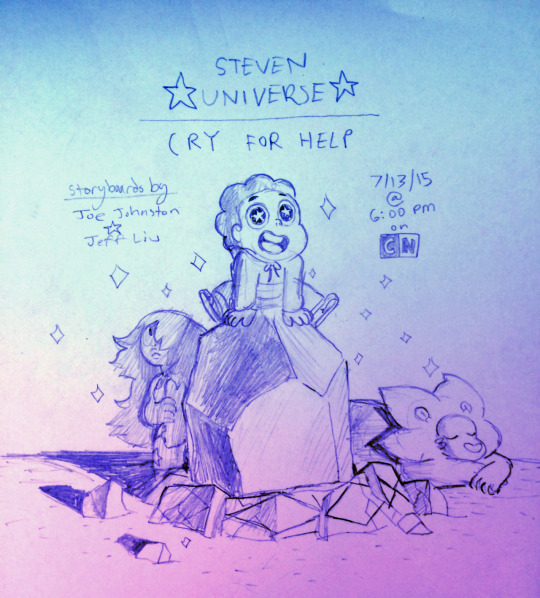
“I don’t understand.”
Pearl has done some awful things in Steven Universe. She nearly kills Steven in Space Race, and even if we ignore the rocket malfunction, her plan was to steal him from Earth for fifty years under false pretenses. She nearly kills Steven again in Rose’s Scabbard through inaction during a fit of furious sorrow. She indoctrinates Connie to see herself as fodder to be sacrificed at a moment’s notice. And she only apologizes in one of these cases.
Before Cry for Help, the show seemed pretty lax with Pearl’s tendency to lash out at others when in pain. While her grief explains her harmful decisions, it also appears to excuse them: most of our focus is on the suffering leading to her actions, not the victims of these actions. Steven comforts her every time she endangers him or his friends, which is nice of him, but suggests that his own feelings are secondary to hers.
It’s honestly reminiscent of Island Adventure, where the show refused to acknowledge the severity of Sadie’s physical and mental abuse. The difference is that Pearl is shown to be in the wrong, while Sadie is portrayed as a hero despite abusing Lars, but it’s still troubling to see Pearl more or less get away with hurting people on a recurring basis.
But it was all a glorious ruse. The Week of Sardonyx is here, groundbreaking for its depiction of a brutal rift that has almost nothing to do with the show’s title character, taking full advantage of the Steven Bomb format to tell a long-term self-contained story about what happens when Pearl finally gets called out for her toxic behavior.
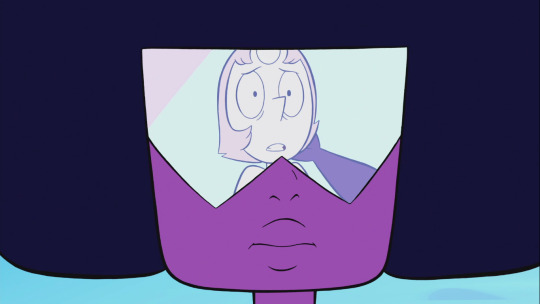
If this story arc was condensed to a single episode, we would certainly spend it watching Pearl and Garnet. But with extra time to set the tone and understand the stakes, we instead see Pearl’s instigating betrayal from Amethyst’s point of view as the latter faces similar fusion woes. The focus on Amethyst is absolute (she even gets a song!), and it makes Pearl’s actions sting so much harder when her perennial rival’s reaction isn’t anger, or glee at the opportunity to tattle, but a deep and heretofore unseen discomfort.
Amethyst, who uses motor oil as a condiment and hoards literal garbage, is ashamed of Pearl. But even so, she comes to Pearl’s defense after outing her deception, because unlike Garnet she can understand the rationale behind Pearl’s actions: Amethyst and Pearl both see Garnet as strong, and themselves as weak. Amethyst misses being Sugilite, conflating fusing with Garnet as a means to share her strength, so she gets why Pearl misses being Sardonyx.
In a conflict between Pearl and Garnet, the most obvious approach is to have our third Gem act as a mediator, but I’m so glad the show developed Amethyst to fit organically into that role. Not just because she’s secretly the most sensitive Gem, or because she understands Pearl without condoning her behavior, but because she’s spent Steven’s whole life as a bridge between him and the other Gems. When you’ve got two close friends coming to a head, there’s nobody better to have in your corner than a middle child.
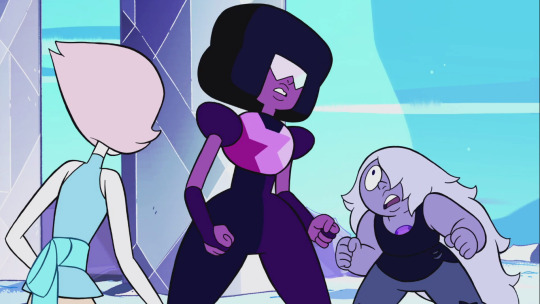
Amethyst's other big role is as a counterpoint to the notion that being sad excuses selfishness or cruelty. Cry for Help encapsulates the series-wide reactions that Pearl and Amethyst have had to sorrow, and seeing both at the same time removes any doubt that Pearl's approach is unhealthy, even if Amethyst’s is far from perfect.
When Pearl gets especially sad, her self-loathing fuels her self-centeredness until she stops caring about how anybody else feels. This is obviously bad news for the people around her, but eventual remorse over her actions fuels her self-loathing even further, and the fire just keeps burning. Everybody loses when Pearl is sad.
But look at what happens when Amethyst is sad in Tiger Millionaire, On the Run, Maximum Capacity, and Reformed: her first response is to show off, usually to Steven. She longs to be included, to be looked up to, so she becomes hyper-aware of how she’s perceived. She plays up the attributes she desires in herself (respective to those episodes: strength, belonging, the ability to chill out without thinking about sad stuff, and a better sense of self) in hopes of hiding her vulnerabilities. Or perhaps just to cope? I wouldn’t want to get all psy-cho-logical on her.
Amethyst and Pearl both struggle with self-esteem. And their actions have some overlap: Pearl taking Steven with her in Space Race sounds like something Amethyst might do, and Amethyst ignoring Steven to hang out with Greg in Maximum Capacity sounds like something Pearl might do (minus Greg, of course). But the intents that prompt these actions are night and day. Pearl wants to punish herself and Amethyst wants to feel comfortable with herself. Pearl is depression and Amethyst is anxiety.
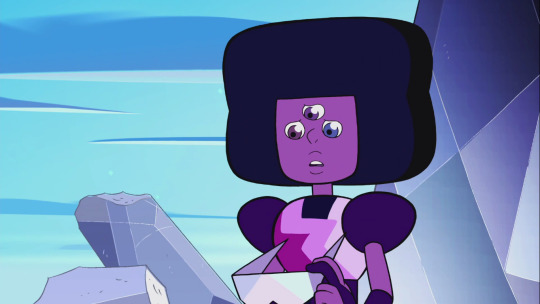
And then we have Garnet, whose healthiness has always been portrayed as a universal positive. She’s strong in every sense of the word, which is great, right? It makes her the bedrock of the team, and gives her an ironclad sense of right and wrong with the conviction to back it up.
But it can also make her oblivious to suffering.
Nothing excuses what Pearl does to Garnet (which we’ll get to, don’t worry), but Cry for Help is part of a long line of episodes displaying the downside of Garnet’s strength: an inability to understand what it’s like to be weak, leading to many moments of callousness that honestly remind me of Pearl at times.
Remember how in Serious Steven she thinks plowing through the dungeon is the best option, even though Steven is clearly rattled? Remember how in Beach Party she’s incapable of caring about wrecking the Pizzas’ sign? Remember how in Monster Buddies she can’t see that her gauntlet is what’s bothering Centy? Remember how in Warp Tour she’s more interested in humoring Steven than taking his worries seriously? Remember how in Love Letters she prefers absolute bluntness to a polite but firm rejection? Remember how in Reformed she gets aggravated with Amethyst instead of exploring the root of the problem, leaving it up to Steven to figure it out? Remember how literally one episode ago in Chille Tid she ignores Pearl’s pleas to help out? Is it really any wonder she can’t see that Pearl and Amethyst are upset in Cry for Help?
This is a huge gap for a character that’s all about understanding, and it’s the reason the Week of Sardonyx is important for Garnet beyond making her a victim. Spoiler alert for Inside Out, but sadness is critical for nurturing empathy, and Garnet's general lack of sadness can make her miss when her friends are upset without...well, without a cry for help. There’s a reason it takes defusing into Ruby and Sapphire for her to start processing what happened to her, because Ruby and Sapphire are a lovable bundle of neuroses next to Garnet’s cool calm.
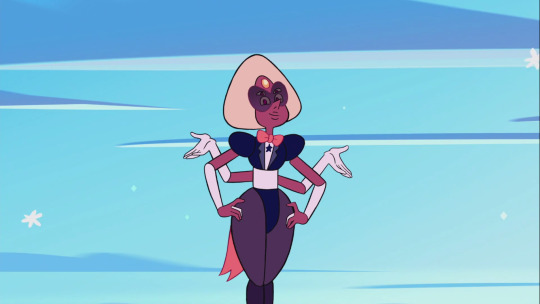
But there’s also a reason defusing into Ruby and Sapphire doesn’t directly lead to Garnet forgiving Pearl, because holy shit Pearl. Once again, fusion’s value as a multi-faceted metaphor is crucial to the tone of the show: there’s plenty of sexual innuendo to it at times, particularly in Cry for Help’s dances, but the fact that it stands in for relationships in general instead of just sex is all that prevents Pearl from being a literal rapist. Not only is consent important, but we were explicitly reminded of this only three episodes ago in Keeping It Together. It would’ve been bad enough if Pearl did this with Amethyst or Steven, but Garnet is particularly concerned with consent in regards to fusion.
Cry for Help tones down the drastic implications of Pearl’s betrayal by giving Garnet a somewhat childish initial response (“You tricked me!”), but from there it pulls no punches portraying Garnet’s righteous fury. Amethyst’s defense only makes her angrier, because it doesn’t matter if Pearl had a motive for fusing with her under false pretenses, and it doesn’t matter that Pearl feels bad about it. Even if it isn’t read as sexual assault (and I genuinely don’t think it’s meant to be, given how the situation resolves), Pearl’s actions are a violation of Garnet, their relationship, and fusion itself. It’s the dark side of the insecurity that fueled the longing hopefulness of sister episode Coach Steven, and it packs the biggest emotional wallop of the series thus far.
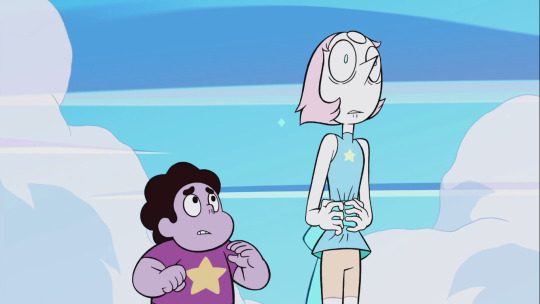
There’s a feeling of hopelessness to the end of Cry for Help that I deeply appreciate, because really, where do we go from here? It’s unlikely that the show would break up the Crystal Gems permanently at this point, but there’s also no real reason for Garnet to ever trust Pearl again. Garnet’s still mad (and she should be), Pearl’s a wreck (and she should be), and Amethyst and Steven have no idea what to do. Cliffhangers like this are rare on Steven Universe, but it does so well at capturing the awkward, awful aftermath of a friend wronging a friend.
Because despite all of this, Pearl is still Garnet’s friend. And I’d argue that despite all of this, Pearl is still a good person. In fact, I’d argue that Pearl being a good person is the most important thing about the Week of Sardonyx. It’s easy to tell a story about a bad person doing a bad thing, but most people see themselves as good, and most people have done at least one bad thing. If we write Pearl off as a monster and leave it at that, what room is there for us to learn? If doing one horrible action is enough to make you a villain, what hope is there for anyone?
I say this while knowing that I’m actually pretty quick to condemn people forever for certain actions: namely, try as I might, I struggle to see any reason for any rapist to be allowed to live. Like, to the point where my first wish if I ever nabbed a genie would be for every rapist on the planet to vanish and get replaced with a note that says “Don’t mourn for me, I was human garbage.” (Obviously there would be many footnotes for this wish; for instance, if a rapist is a pilot I don’t want to endanger folks on a flight, so extra magic would have to intervene. I have really thought this out, I got the footnotes all set, I am ready to find a genie.)
If that’s how I feel, how is it that I have such empathy for Pearl, even though I’m completely on Garnet’s side? It’s not that she’s fictional, because I’m not huge on fictional rapists either. And it’s not that her action isn’t actually rape, because it’s still a gigantic violation. So I honestly don’t know. But Steven Universe is capable of making me examine how I view the world in a way few shows can, and even if I don’t think the Week of Sardonyx quite sticks the landing, the opening is appropriately wrenching stuff.
(With funny weeping foodstuffs to keep the younger audience from getting too upset. Not the subtlest subtext in the world, but I’ve got no beef with kids’ shows keeping things grounded for kids.)
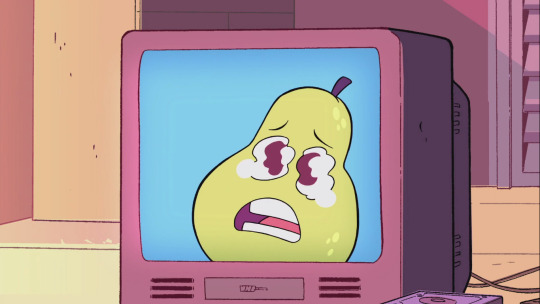
Future Vision!
Nothing too direct, but the Week of Sardonyx’s angst returns with a vengeance in the Breakup Arc immediately following Wanted. Multiple episodes of working through an argument? Check. A sense of betrayal involving fusion? Check (sorta). A resolution brought about by a common enemy? Check. The biggest difference (beyond the shifted focus to Steven) is that the Breakup Arc is more invested on making you miserable on an episode-by-episode basis, making it even harder to watch. Want a break from Steven and Connie not talking? Have a secondary breakup between Peridot and Lapis!
Pearl’s similarity with Spinel makes the movie’s exploration of a suffering Gem’s toxic reaction to pain a fascinating companion piece to the Week of Sardonyx. The major difference is that Pearl hurts others due to selfish thoughtlessness and Spinel’s goal is hurting others, but both have great reasons to feel terrible, neither has a great reason to inflict this pain upon others, and both need to make a change.
We’re the one, we’re the ONE! TWO! THREE! FOUR!
This is the episode in my “Love ‘em” category that I’ve watched the least, because it’s a tough one. I more appreciate Cry for Help than enjoy it, because it’s not meant to be enjoyable, but it’s still worth putting up there because man does it nail the tone.
Top Fifteen
Steven and the Stevens
Mirror Gem
Lion 3: Straight to Video
Alone Together
The Return
Jailbreak
Sworn to the Sword
Rose’s Scabbard
Coach Steven
Giant Woman
Winter Forecast
Chille Tid
Keeping It Together
On the Run
Warp Tour
Love ‘em
Laser Light Cannon
Bubble Buddies
Tiger Millionaire
Lion 2: The Movie
Rose’s Room
An Indirect Kiss
Ocean Gem
Space Race
Garnet’s Universe
The Test
Future Vision
Maximum Capacity
Marble Madness
Political Power
Full Disclosure
Joy Ride
We Need to Talk
Cry for Help
Like ‘em
Gem Glow
Frybo
Arcade Mania
So Many Birthdays
Lars and the Cool Kids
Onion Trade
Steven the Sword Fighter
Beach Party
Monster Buddies
Keep Beach City Weird
Watermelon Steven
The Message
Open Book
Story for Steven
Shirt Club
Love Letters
Reformed
Rising Tides, Crashing Tides
Enh
Cheeseburger Backpack
Together Breakfast
Cat Fingers
Serious Steven
Steven’s Lion
Joking Victim
Secret Team
Say Uncle
No Thanks!
4. Horror Club
3. Fusion Cuisine
2. House Guest
1. Island Adventure
51 notes
·
View notes
Text
...We’re missing something

- ‘Separation’, W. S. Merwin
These thoughts started as a couple of tweets, and grew. They are not fully formed but I am profoundly discomforted by the ways in which the dead are (or are not) being talked about in all our leaders’ plans and public discourses about roadmaps ‘out’ of this crisis, and the (unstated) implications of their absence. So here are some rough, ill-formed thoughts for now.
“Lets face it. We’re undone by each other. And if we’re not, we’re missing something”
-Butler, Precarious Life, 2004, 23
I’ve been trying to work (as we all are), at home, while simultaneously checking in on friends and family, building new, smaller routines. I’ve been trying to stay away from commenting on the current context, because who has words right now? Yet I haven’t been able to get a question out of my head; its been floating around, running across the tip of my tongue, looking for an answer. Who will mourn the dead? Or, perhaps, why won’t we mourn the dead?
The death toll globally, now in the hundreds of thousands, continues to rise. Yet I am struck by the absence of mourning. On my twitter timeline I scroll past tweets announcing the deaths of family members—‘My brilliant dad died of COIVD this morning’… ‘My grandma succumbed, we couldn’t be there’… ‘Here is a photo of my mother before I was born, she’s gone and I miss her so much’… But still, this mourning, these stories are small, personal, isolated. Swallowed up in the noise of my twitter timeline. Photos circulate of middle-of-the-night army convoys in northern Italy carrying the immense volume of dead to neighbouring morgues, aerial shots of mass graves on Hart’s Island in New York, thousands of families collecting funerary urns in China. The dead are present. And yet they are not. So, I have to ask, why are we not mourning collectively? Where is the shared grief? The commemoration of names, and lives, and stories?
Commemoration can be jingoistic, and nationalistic; it can be perverted for political ends. Yet commemoration also holds us together, pierces our self obsession, recognises something bigger is going on.
When the towers collapsed in New York in 2001 you couldn’t escape the smiling holiday snaps of victims, hour-long specials about their lives and their deaths. When MH17 crashed, Victoria’s largest church filled with mourners. Is this crisis too large? Are we too separated? Or is it easier not to confront the reality when the future is so uncertain.
Shut in our houses the news drones about economic recovery, measuring the dead in the same graphic images, numbers soaring up in inverse to the plummet of the stock market. But there are no people in these stories. They are numbers, and the tallying obscures the fleshy reality of what is being counted.
Reflecting on the American war story and repatriation of the dead, Kandida Purnell argues that ‘national binding in grief’ can only happen if together bodies feel an intensification of emotion (2018, 159). I don’t want to compare the dead from COVID to war dead—for many reasons, some beautifully laid out by Cynthia Enloe—but Purnell’s work on war dead demonstrates the impetus in seeing and speaking of the dead can provide towards collective commemoration and accounting.
Judith Butler notes that ‘many people think grief is privatised’ and depoliticised, but Butler argues that ‘it furnishes a sense of political community of a complex order, and it does this first of all by bringing to the fore the relational ties that have implications for theorizing fundamental dependency and ethical responsibility’ (2004: 22). It brings attention to the ‘we’, the relational, collective constitution of our human condition.
An absence of grief, a lack of mourning, means those relational ties are not felt, they are not made present. How different might people’s behaviours be, under lockdown and as lockdowns lift, if they felt not selfish frustration at being confined to home, but if confinement was understood as a relational act of solidarity motivated by engaging in and with grieving and memorialisation of those who have died because of this virus? An act of conscious care.
Sara Ahmed (2004) argues that stories of pain must be heard for people to be moved by others’ suffering. There is an absence of these stories in mainstream outlets, although they circulate on twitter. How might we be moved if we allowed ourselves to sit with others’ pain? What does it mean that we are so interested in getting back to the pub, to visit mum for Mothers day, to celebrate the outcome of another enormous loss of life with VE day celebrations in the UK for example, that we don’t think about the potential deaths caused by our actions?
When lockdowns lift before the curve has flattened, it is a signal that some lives matter less than others; this is invisible and unstated but present. Again, in the realm of war, Maja Zehfuss points to the particular position of soldiers “whose lives are grievable [as per Butler] and yet put at risk in order, apparently, to protect other lives” (2009: 419). Again, healthcare workers, school teachers, public transport drivers, cleaners, are not soldiers (and it speaks to the paucity of our analyses that it is in war we look for these sacrifices and not in everyday life, and I’m reflecting too, on my own vocabulary in looking for spaces to speak of grief). Yet if you call them frontline workers, the battlefield is invoked, and their risk is rendered intelligible—to protect others. On twitter, I saw someone observe that when we talk about going back to ‘normal’ we are talking about low-paid workers working to allow others to stay home, but with more comforts. The politics of this disease and its violence—as others have noted—is racialised, gendered, and classed (and globally differentiated ). More war analogies: who are we willing to sacrifice?
I don’t want to re-appropriate Butler’s conception of ‘grievable life’ entirely out of the context/s in which she presents it (replete with the complexities of uneven global power relations, and a persistent imperial gaze), however, the idea of grievability is profoundly valuable here, because to be able to grieve a death, according to Butler, you have to be able to imagine it as a life that should have been lived, and that requires a recognition of the fundamental sociality of our lives, and our bodies.
“But if we are social beings and our survival depends upon a recognition of interdependency…then it is not as an isolated and bounded being that I survive, but as one whose boundary exposes me to others in ways that are voluntary and involuntary (sometimes at once), an exposure that is the condition of sociality and survival alike” (2010: 54).
I’m not sure I’m saying that those who have died from COVID19 are ungrievable lives, but their deaths are being rendered invisible, unmarked, except in exponential log-graphs. If they can’t be conceived of, they can’t be mourned. In whose interest is it that we do not mourn; in whose interest is it that we lose sight of the social constitution of ourselves?
In this ‘easing restrictions’ and ‘lifting stay home orders’ can be justified in terms of the economy and ‘returning to normal’, ignoring the cost at which this will come. Because some lives are more grievable than others. In places in recent weeks this differentiated value of life is explicit. News outlets and ‘journalists’ make this claim explicitly. Others justify their lockdown-violating/bending behaviour because they are not in a ‘risk’ group, implicitly and explicitly at times, arguing that those with risks and vulnerabilities are worth less, that their deaths would be acceptable if others could ‘return’ to normal life. I don’t know even where to start in trying to convince people they should care about others.
Those who have died are not the ‘glorious’ dead of a foreign war, but rather the shameful dead whose deaths highlight the failings of the political class to act quickly enough, or out of anything other than self preservation. Lack of mourning is not passive, but predicated on active choices. Deaths are hidden, obfuscated, non- or mis- counted. Ungrievable deaths are not just unmarked, but are ‘unmarkable’. They ‘disappear into the ellipses by which public discourse proceeds’ (Butler, 2004, 35). And the public discourse reifies capitalist production that values labour over lives. It doesn’t have to be like this. As Arundhati Roy described, in a much shared piece last month, the pandemic is a portal, a gateway. We can imagine a different world. But to do so we have to make visible the deliberate strategies that try and justify and minimise the deaths of loved ones, near and far.
Roxani Krystalli, in a beautiful tiny letter last year reflecting on the burning of Notre Dame, the attacks in Sri Lanka, and noticing birdsong, called for us to ‘ask questions of our empathy and its failures’. An attentiveness to absences that would serve us well in the current context where so much of the suffering is occurring behind walls and doors and bodies.
Early in the lockdowns an text-image circulated on social media (I cannot find it again as I go to type this, thanks to the ephemerality of Instagram and twitter - EDIT, I found it, thanks to brilliant friend India Allender, posted below) naming the empty streets not as something to fear but as representative of a radical act of love. It is out of love for others—for those we know, and those we do not—that we remove ourselves from public places, restrict our movements. This is the shared vulnerability, the fundamental sociality of our embodied selves, that Butler talks about.
Yet as we move in public and private discourse from ‘we’ statements to ‘I’ statements—I want to go out, I want to see my friends, I am not high risk—we lose sight of that collectivity, and the emotional resonance, as Purnell argues, required for collective commemoration, dissipates. This violent teleological drive to reopen society is predicated on a refusal to acknowledge the loss we’ve all suffered, collectively.
Perhaps a concerted efforts to see the dead, to mourn them, is an ethical responsibility as Butler notes, and it allows a reclaiming of that collective space, a willingness to stay apart, stay home, until we can all be safe.

- post I originally saw on Instagram as a text-only post, that has been printed and pasted to the side of a building.
0 notes
Photo
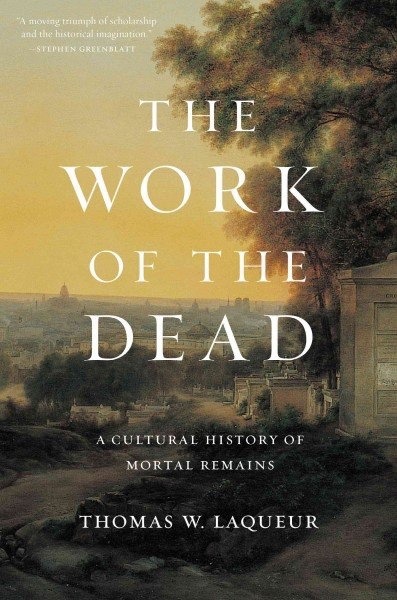

“The Work of the Dead” by Thomas W. Laqueur, 2015.
“Billions and billions of the dead–at least 90 percent and probably nearer to 95 percent of all who ever died–have disappeared without leaving a name behind” (p. 431). We could, with every footfall, be walking over the dust of the dead.
Argh, I finally finished this lumbering behemoth of a book (posted on Goodreads in Autumn 2016). While being a true work of scholarship, in the most boring sense of the term, Laqueuer’s Herculean effort of tackling the mightiest of elephants in the room of “Western” society (i.e., Death, with a capital D), is noble, necessary, and terribly elucidating for the layperson, the college student, and the intellectually and existentially curious. However, this book is also a slow grind to read, at least for me. While the main theme is to focus on the idea of, treatment of, Death and the Dead, post-Enlightenment, with a narrowed focus on the U.K. (and later in the “necronominalism” of the U.S.), religiously, philosophically, culturally, politically, and socially, it takes Laqueur some 180 pages to even get to Martin Luther, Voltaire, and David Hume. Time after time, it seems, this work is riddled with repetitious thoughts and directed along a serpentine course that gets madly muddled. Chapters have introductory pages, sections have introductions paragraphs-long, and subsections often have some reflective introduction with sprinkled signposts letting the reader know where he or she stands on this journey. The use of endnotes over footnotes, also (to me) is tough since I like footnotes (I mean, come on, even Max Brooks used them expertly in fiction) and they are much cited in the text here.
One glaring oversight I found was Socrates being cited for what Plato wrote. Such a missed editing issue automatically makes me wonder what other tiny missteps hide within the pages. Please don’t get me wrong. This is a profound work of scholarship that must have taken an incredible amount of time to research and write. Blending history in all its layers with anthropology, cultural psychology, etymology, necrogeography, etc. is nothing short of tough. At 550 lead-dense pages, with almost 80 pages of endnotes, such an undertaking is worthy of accolades; yet, I wonder if this subject couldn’t be more easily construed for readers outside lofty academic circles (for the record, I have two masters degrees with a long-ago undergrad minor in Philosophy: ignorant I am not). With 180 pages of appetizers expended trying to build up to the main course, there seems a sadly missed opportunity to tie Greco-Roman, pre-Christian Jewish, and pre-Islam Arab practices/belief systems/mindsets of death, the dying, and the dead together, as they all contribute to the construction of institutional Christian thought, never mind the romantic idolatry and pervasive iconography of such themes transforming throughout history.
What I do love is using my hero-god Diogenes as the keystone to this entire book. No greater person could fill the Cynic’s dirty, unshod, philosophical feet regarding this topic.
Perhaps it’s just the author’s writing style. If so, such a style will probably never reach a wide audience, and maybe that’s just fine, but I wish the issues of death and dying were more pronounced in culture. That is not a macabre statement at all. Coming from a Buddhist perspective, death is inevitable and should not be feared. We live, we die. Reading this history of perception and practice gifted me with greater clarity into how the individual mindset, swamped by external and historical forces, shapes one’s worldview concerning death and dying. By “worldview” I mean that far beyond family, community, and nation. This is supreme existentialism. Wheeling galaxies, endless expanses of lifeless space, dark matter and multiverses, stars going nova and black holes yawning into presumed oblivion, and while the insects of mankind writhe, suffer, devour, and breed on this little speck of warm rock blessed with oxygen and water, wobbling around a sun. Accept death with peace, and thrive with life. The truly ironic and humorous thing is that in the “Western” world, death is ever-present. Any TV show, film, and book deals with it on some level, fine art often tackles it directly and my beloved metal music also delves deep into the subject matter explicitly, and yet the mostly insular societies of the “West” cower with chronophobia, the fear of dying, ignorant of deep time, narcissistic and idolatrous, never mind the usurpation of Memorial Day by neoliberal capitalism. Look at the last month+ of “worshipping” the man formally known as some goofy symbol, formally known as “Prince,” nearly deified after death because he sang pop songs. Will the more magnanimous persona of Muhammad Ali unseat Prince from the populist spotlight of the media-driven sheeple? Time will tell; history will record.
From zombie and vampire shows to the ephemeral news-cycle “tragedy” of the moment, death is forever ever-present, danced around, deflected onto others, personified by classism (how many people perished while idiots pondered Prince), feared but never really embraced, played with by power (i.e., the unceremonious disposal of Osama bin Laden, the “heroic” fratricidal death of Pat Tillman), etc., etc. Laqueur covers all of this as it evolved in Europe (and the U.S.), and it is this evolution that is truly mesmerizing. “The disembodied names of the dead are thus the strangest of that strange category of noun, the proper name, because they are shadows of shadows: more insubstantial than ghosts” (p. 366). What does it mean to revere Prince, or Ghandi, or Shakespeare, or Muhammad, or Achilles? Is this post a form of memorial to my virtual identity as a reader and critic, or will it be lost in the endless detritus of online postings, or burned away when Goodreads becomes unprofitable to the mighty giant Amazon? We are all mulch for trees, ultimately, and as a follower of Diogenes, that sits just fine because in the end a person is a corpse who moves on to whatever awaits us on the other side of life.
For me, a deeper evolutionary excavation is even more profound, such as archeologists and cultural anthropologists currently mired in debate about the origins of early humankind’s conscious practice of “burial,” as recent finds in South Africa allude to with greater poignancy. When did we, as socially grouped, tool-using monkey-people (some 70 million years ago) decide we didn’t like seeing our fallen brethren being ripped apart by other predators and carrion-eaters, and how did such belief systems grow into a multi-billion-dollar funerary industry fueled by spiritual spectacle? When did the belief of fallen-soldiers-as-fodder transform into fallen-soldiers-as-public-and-political-capital? I believe the dead body is a mirror to mortality, and a gateway to the cataclysmic Unknown that has ensorcelled conscious humanoids since the spark of awakening ignited the imagination, grunting and pointing to the moving pinpricks of starlight scintillating in the night sky.
Death finds us all; it is an unglamorous, typically painful (unless one is blessed with sedatives), and an incredibly lonely experience, and you will one day experience it fully. To embrace the philosophy and spirituality of death is to live life more fully, more purposefully, more cognizant that each day counts for something much greater than ourselves. Raise your children well, help strangers in need, support those dealing with strife, empathize with those of different cultures and creeds, and protect the planet for the ecosystems of future generations that inevitably inherit our greed-driven, myopic disasters-in-the-making.
As Nabokov wrote,
“Our existence is but a brief crack of light between two eternities of darkness.”
And,
As Horace exclaimed long ago,
“No dirges for my fancied death; No weak lament, no mournful stave; All clamorous grief were waste of breath, And vain the tribute of a grave.”
When my body hits the cold floor for the final time, the Neptune Society will escort my ashes to the sea, and into oblivion I go peacefully, a shadow of a shadow cut away by the sun.
Painting (and jacket art) by Louise-Josephine Sarazin de Belmont, “Paris, vu des hauteurs du Pere Lachaise,” painted sometime between 1842-59. (The exact date is apparently unknown, because she was a woman, and female artists are historically crapped upon by patriarchal societies; thankfully, her work survived, and her rock-star name outlasts the tomb.)
#literature#philosophy#book review#death#dying#mortality#finality#history#psychology#social psychology#Neptune Society
2 notes
·
View notes